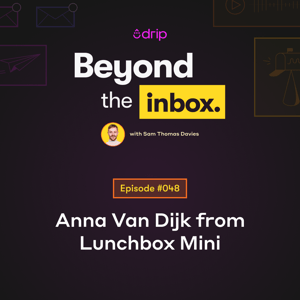
In this episode of Beyond the Inbox, host Sam interviews Anna Van Dijk, the founder of Lunchbox Mini and Crumbs Co. Anna discusses her journey as a founder and a parent, sharing the unique challenges and successes she’s experienced in growing her online business.
Anna begins by discussing the unique order flow system she has developed, featuring a VIP squad for loyal customers. This system operates much like a customer loyalty program, rewarding customers for repeat purchases and incentivizing them to continue shopping with Lunchbox Mini.
The conversation then shifts to the topic of email marketing. Anna shares that she sends out two weekly emails, one focusing on personal updates and another highlighting new products or offerings. She emphasizes the importance of personal connection in these emails, often including photos of her team and behind-the-scenes glimpses into the workings of the business.
A significant part of the podcast is dedicated to discussing the balance between personal and professional life, particularly as the public face of a brand. Anna shares her initial struggles with putting herself at the forefront of her brand, and how she overcame these challenges by imagining she was talking to a friend. However, as her children grew older and her brand grew larger, she found it necessary to establish boundaries to protect her family’s privacy and maintain a healthy work-life balance.
Anna also shares her experiences with product lifecycle and customer purchase behavior, noting that many customers start conservatively, then return to purchase more products once they feel comfortable. To encourage this behavior, Anna sends a follow-up email offering free shipping to customers who may have forgotten to add additional items to their order.
The interview concludes with a discussion of Anna's second venture, Crumbs Co. This offshoot of Lunchbox Mini offers purpose-sized silicone molds for baking that perfectly fit into the compartments of the lunchboxes, making lunch packing even more convenient for parents. Anna has seen significant success with this new product line, selling out with each release and establishing stockists in five different countries.
Throughout the episode, Anna offers valuable insights and advice for other parents thinking about starting their own online businesses, emphasizing the importance of setting clear boundaries, being personable with customers, and constantly innovating to stand out in a saturated market.
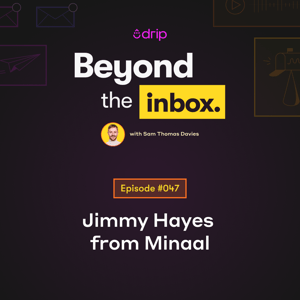
In this episode of Beyond the Inbox, Jimmy Hayes, co-founder of Minaal, shares the journey of how Minaal transitioned from a simple crowdfunding campaign to a successful brand renowned for its superior quality travel bags.
Hayes starts by discussing the challenges that arose when launching a product amidst a pandemic. The timing seemed unfortunate as their hero product was lined up for release just as the pandemic hit. However, they decided to launch it regardless, raising enough money through pre-orders to cover production costs. Despite the difficult period, Hayes emphasizes the importance of their community, many of whom were original backers from their first Kickstarter campaign in 2013. The community's support during this challenging time was instrumental in keeping the company afloat and served as a reminder of the power of community investment.
Next, Hayes moves onto the importance of building a community. He explains how Minaal started with a product made for themselves, targeting people with similar needs and lifestyle. This approach fostered organic relationships with their customers, who felt invested in the brand and its products. He notes that many of their customers feel like friends, given the long-term relationships they have built over time.
One of the key marketing strategies Hayes highlights is the role of email marketing in their business. He explains that email has always been their primary mode of communication, using it for both community communication and sales. With detailed and strategic automations set up, Minaal has been able to nurture customer relationships and increase sales without constant manual follow-ups.
Hayes also touches upon the concept of customer lifetime value and upselling. Given that Minaal promises high-quality products that last a lifetime, they ensure that customers are aware of all their options during their first purchase. The company grows through strategic and slow-paced product releases, making each launch meaningful and anticipated by customers.
Looking ahead, Hayes envisions Minaal continuing to focus on the process rather than the end state. The company aims to provide people with excellent experiences, products, and memories, and sees its growth as a result of this focus.
In conclusion, this episode provides valuable insights into how a business can successfully navigate challenges, build a strong community, and leverage email marketing to foster customer relationships and drive sales.
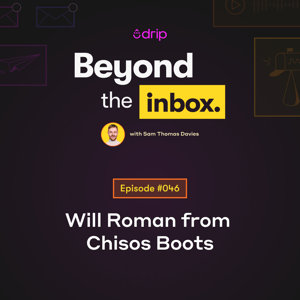
In this episode of Beyond the Inbox, Will Roman, the founder of Chisos Boots, joins us to discuss his journey of creating a Texas-based boot brand known for its high-quality, handcrafted boots. Will shares how he has built a strong community around the brand and emphasizes the value of craftsmanship and exceptional customer experiences.
The conversation begins with Will expressing his desire to make people aware that Chisos Boots is different from other brands and that they prioritize certain approaches when it comes to craftsmanship and quality. He explains that while there are other brands producing good boots, Chisos Boots stands out by merging comfort and craftsmanship. Will highlights the importance of customer feedback and the role it plays in improving their products.
Will introduces the team behind Chisos Boots, mentioning that they have four members in Austin and a workshop in Juan Wato, outside the city of Leon. He discusses how he initially acquired customers by showcasing his prototypes and production models in bars on Sixth Street in Austin. This unconventional approach allowed him to receive real-time feedback from people and make early sales.
The feedback from customers trying on the boots for the first time was overwhelmingly positive. Many were surprised by the comfort and quality of the handcrafted boots, as they were used to experiencing a break-in period with other brands. Will explains that Chisos Boots conditions the leather and simulates walking in the boots before selling them, resulting in a partially broken-in feel right out of the store.
The conversation takes an interesting turn as Will shares a story about the Virginia Beach bomb squad reaching out to him after seeing a video of boots being subjected to various tests. This unexpected connection led to a memorable tour and further publicity for Chisos Boots. Will emphasizes the importance of word-of-mouth marketing and the support of their community in driving their business.
Will discusses the three tiers of their brand: building a long-lasting product, contributing back to land conservation in Texas through sales, and creating a physical gathering place for the community. He expresses his pride in Chisos Boots being a brand that customers are proud to wear and share with others.
As the conversation progresses, Will mentions that they offer free shipping for Texans as a way to show their love and pride for Texas. He talks about the importance of building lasting relationships with customers and creating a brand that people identify with and trust.
Will touches on the challenge of professionalizing the business while maintaining the quality and values that set Chisos Boots apart. He emphasizes the need to grow at a reasonable rate without sacrificing the core aspects that customers appreciate.
In closing, Will shares his vision for the future of Chisos Boots, which includes remaining a relatively small team, expanding their facilities, and creating a gathering place for customers. He expresses his commitment to maintaining the brand's quality and customer relationships as they continue to grow.
Overall, this episode of Beyond the Inbox provides valuable insights into the journey of Chisos Boots, highlighting the importance of community, craftsmanship, and exceptional customer experiences in building a successful brand.
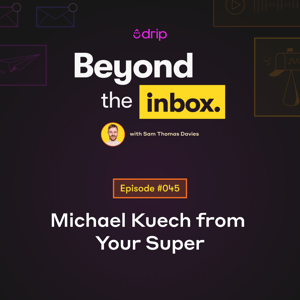
In this episode of Beyond the Inbox, host Sam sat down with Michael Kuech, co-founder of Your Super, a brand dedicated to promoting health and wellness through their line of superfood mixes. Michael detailed his inspiring journey, from a personal health crisis to the creation of a successful health-conscious brand.
Michael's journey began with a cancer diagnosis at 24, which led to a deep interest in health and nutrition. Along with his partner, Crystal, he set out to create a line of superfood mixes that would make healthy eating accessible and enjoyable. They began their venture with a Shopify shop as a platform for pre-sales.
Michael emphasized the importance of sourcing high-quality ingredients for their products. He shared how they learned about the superfood industry, including the varying quality of superfoods depending on their source. Despite the higher cost, they chose quality over price, ensuring their products were 100% organic and packed with nutrients.
Discussing the landscape of the superfood market at their startup time, Michael noted that while superfoods had been around for quite some time, their approach of combining different superfoods to create functional mixes was novel. This innovative approach made superfoods more accessible to users and helped them gain traction in the market.
The conversation then shifted towards the business side of things, discussing their move from Europe to the US. Surprised by the number of US customers willing to pay high shipping costs and wait weeks for their products, they decided to transition to the US market.
Marketing and customer acquisition strategies were another key topic. Michael highlighted the power of storytelling in their brand promotion. By telling their story authentically and focusing on the emotional connection with their customers, they were able to differentiate their brand in a competitive market.
Email marketing played an integral role in their brand growth, contributing to 20-30% of their revenues. Michael shared how they used email to guide customers through their product offerings and continue the storytelling aspect of their brand.
Discussing the changes in the superfood industry over the years, Michael noted an influx of new players but lamented that the quality of products hasn't always kept pace. He urged consumers to scrutinize ingredient lists and opt for cleaner, simpler products.
Michael emphasized the importance of customer obsession and building a thriving community around their brand. He shared their strategy of creating a community where members help each other, fostered through events, live sessions, and shared experiences.
Despite selling the company, Michael and Crystal remain the face of the brand, focusing on inspiring people, creating recipes, doing social media outreach, and participating in community events. The duo's mission for the future is clear: to continue promoting healthy eating through the power of plants, as they inspire millions to lead healthier lives.

In this episode of Beyond the Inbox, host Sam chats with Leonardo Caracas, a seasoned expert specializing in e-commerce growth strategies from Jump Ventures. Leonardo shares his insights and experiences in scaling businesses, focusing on key areas such as content generation, commercial planning, financial optimization, and the ever-important data and tech stack.
Leonardo begins by emphasizing the need for a well-defined growth strategy, highlighting the importance of an optimized financial structure and a comprehensive tech stack. He also stresses the significance of internationalization where applicable, underscoring the potential benefits of expanding beyond the home market.
Further into their conversation, Leonardo discusses a real-life example of a company which successfully scaled its annual revenue from 1 million US dollars to a whopping 20 million within a year. He attributes this remarkable success to the company's programmatic approach and highlights how tackling major issues like outdated content and lack of a content machine played a pivotal role in their growth.
The discussion moves on to the importance of Average Order Value (AOV) and repurchase rates. Leonardo explains how increasing AOV and focusing on strategies to encourage repeat purchases can significantly boost a company's profitability. He also draws attention to the role of a well-planned product launch calendar in driving growth.
As the conversation progresses, Leonardo shares his perspective on the four key performance indicators (KPIs) that businesses should keep in mind: reviews, repurchase rate, AOV, and conversion rate. He emphasizes that maintaining high reviews and a repurchase rate of at least 30% is vital for a business's viability. He also underlines the necessity of achieving an AOV of at least $75 and maintaining a conversion rate of above 3% for sustainable growth.
Towards the end of the podcast, Leonardo advises e-commerce professionals to be proactive and stay updated about the latest developments in the industry. He encourages listeners to constantly test new strategies, stay on top of industry trends, and always be prepared for the future.
The episode concludes with Leonardo inviting listeners to visit the Jump Ventures website for more information and potential collaboration opportunities. He also emphasizes the company's commitment to mentoring and coaching potential growth businesses free of charge, reflecting Jump Ventures' dedication to fostering growth in the e-commerce industry.
This episode of Beyond the Inbox offers a wealth of insights into e-commerce growth strategies. Leonardo's expertise and hands-on experience provide listeners with valuable advice and practical takeaways, making it a must-listen for anyone in the e-commerce space.
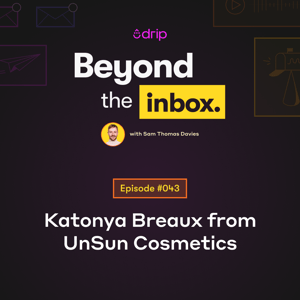
In this episode of Beyond the Inbox, Katonya Breaux, the founder of Unsun Cosmetics, shares the story behind her sunscreen brand designed specifically for people of color. The conversation begins with Katonya recounting her personal experience with sun damage and the misconceptions she discovered among the black community regarding the necessity of sunscreen. This personal experience sparked her interest in developing a sunscreen product that caters to people of color.
The conversation shifts to the educational aspect of Unsun Cosmetics. Katonya explains how she leverages podcasts, social media, and partnerships with organizations like the Melanoma Research Foundation to raise awareness about the importance of sunscreen for people of color. She underlines the significance of debunking the myth that melanin-rich skin does not need sunscreen protection.
Katonya discusses the initial challenges of acquiring customers and how her first retail partnership solidified the business. She also shares the evolution of the brand since its launch in 2016, including the expansion of product lines from one to 11 skus across two lines.
Unsun Cosmetics' commitment to using clean mineral-based sunscreens is a core part of the brand's vision that has remained unchanged. Katonya explains the differences between mineral and chemical sunscreens, advocating for the safety and environmental benefits of mineral-based products.
In terms of marketing, Katonya admits that convincing people of color about the need for sunscreen and explaining the difference between mineral and chemical sunscreens can be challenging. Her approach emphasizes authenticity, education, and the importance of wearing sunscreen, regardless of the brand.
The conversation also covers the brand's marketing strategies, including their use of email, SMS, community events, and a unique "gorilla marketing" approach. Katonya shares their upcoming billboard campaign "Don't Get Ghosted by Your Sunscreen," aimed at increasing brand awareness.
Katonya highlights the challenges she has faced as a founder, particularly in securing funding. Despite these challenges, Unsun Cosmetics continues to grow, with plans to launch a new SPF 50 product by the end of the year.
The episode concludes with Katonya sharing her insights on the concept of community, the importance of direct engagement with customers, and the future plans for Unsun Cosmetics. She emphasizes that the mission of Unsun Cosmetics is not just about selling a product, but about educating and making a positive impact in the beauty industry.

In this episode of Beyond the Inbox, host Sam talks with Jessie Healy, a media buying expert and founder of Webtopia. Jessie discusses the changing landscape of media buying, particularly in the realm of paid social advertising.
She delves into the importance of creativity in driving successful ad campaigns, explaining how a strong creative vision can make all the difference in getting an ad noticed and making it effective. She emphasizes the need for understanding customer psychology and buyer behavior, and how these insights should shape the creation of ad campaigns.
Jessie highlights the use of psychological frameworks in advertising. She explains the "pain point agitate solution" concept, which involves identifying a customer's problem, intensifying their awareness of that problem, and then presenting a product or service as the solution. She also discusses the importance of focusing on benefits rather than features, and the key role emotions play in consumer purchase decisions.
She shares her insights into how user-generated content taps into a primal need for tribal validation and belonging, and how it can be a powerful tool in digital advertising. She further discusses the importance of representing a diverse range of personas in advertisements to ensure that potential customers can identify with the product or service being advertised.
Jessie also talks about the balance between building and optimizing in paid social advertising. She cautions against pursuing too many different testing strategies at once, especially for brands with small budgets, and emphasizes the importance of understanding the platform you're advertising on and tailoring your strategies accordingly.
She points out common mistakes brands make, such as trying to run ads on multiple platforms simultaneously and not investing enough in creative development. Jessie also stresses the critical role of copywriting in successful advertising, and how powerful copy can significantly improve the performance of an ad.
Towards the end of the conversation, Jessie shares her perspective on the future of the paid social landscape. She predicts that while automation will continue to play a significant role, there will always be a need for human media buyers to analyze and stay on top of the platforms. She also believes that creative will continue to be the battleground and that brands that harness artificial intelligence in smart ways will have an edge.
In conclusion, this episode of Beyond the Inbox provides valuable insights into the world of paid social media buying, offering strategies and tactics for brands to navigate this ever-changing field effectively.

In this episode of Beyond the Inbox, host Sam chats with Selene Dior, the founder of Vitae Apparel. Selene shares her journey of entrepreneurship, starting from the inception of her brand to its current success. She sheds light on the importance of influencer marketing, which contributes a significant 20% to her brand's revenue. Despite the challenges of filtering through a growing pool of influencers, Selene emphasizes the importance of partnering with those who have a strong, engaged community.
Selene also highlights the pivotal role Notion played in her company's growth. She fell in love with this tool four years ago and has since used it as the hub of information for her company, including everything from Employee Handbooks to Standard Operating Procedures (SOPs). Despite the rapid scaling of her team and the challenges it brought, she acknowledges the need for a structured onboarding process and readily available SOPs for new hires.
The conversation then shifts to Vitae's mobile app, which contributes a notable 25-30% of the company's revenue. Selene explains that the app is more than a shopping platform - it's a resource center that supports customers' lifestyle and wellness habits. The app hosts exclusive campaigns, workout videos, cookbooks, and meditation tracks. Selene also shares the importance of push notifications, which are free for her team to use.
Selene also talks about her decision to become the face of her brand and the power of transparency and storytelling. She shares her struggles with burnout and financial challenges and emphasizes the importance of forming a personal connection with her community. Despite the initial reluctance and vulnerability, she acknowledges the benefits and the increased engagement it has brought to her brand.
The podcast concludes with a look into Vitae's future. Selene plans to pivot the brand towards wellness and launch a podcast featuring customer stories about overcoming mental health challenges and building self-confidence. She also shares her plans for rebranding Vitae to cater to an older demographic. Despite the many challenges and moving parts, Selene displays a clear vision for her brand and a deep understanding of her community.
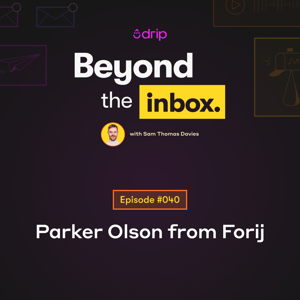
In this episode of Beyond the Inbox, host Sam interviews Parker Olson, the founder of Forage. Throughout the conversation, Parker recounts his unique entrepreneurial journey, shares his innovative marketing strategies, and discusses his visions for Forage's future.
Parker's unconventional approach to building his business is a central theme of the conversation. He recounts his experiences of living in a tent while building the brand and later transitioning to a van. His commitment and belief in the brand, despite the anxiety of bringing a product to market, are palpable. Parker believes that to succeed, one must be all in and full of belief.
Early wins for Forage included strong local sales traction and early belief from a couple of angel investors who helped them get off the ground. One of their significant achievements was being included in a major retail distributor's emerging brand portfolio, a selection of only 10 brands out of a 10,000 brand portfolio.
Parker also discusses Forage's transition from retail to Direct-to-Consumer (DTC). Initially, they started in a few retailers around Seattle before quickly moving into DTC. Once they had access to distribution through a big distributor, Parker hit the road to "bang on doors".
The conversation then shifts towards the buyer's journey on their website. Parker explains that many people start by visiting their blog, which drives significant traffic due to their SEO efforts. On average, they attract 30 to 60,000 unique users to the blog each month. The next steps usually include visiting the product page and making a purchase, with subscriptions typically happening on the second or third purchase.
Parker shares details about their 30-day clarity commitment, a unique satisfaction guarantee that promises customers a full refund if they don't love their snacks and feel their brain clarity improve in 30 days. This guarantee stands out as a strong commitment to customer satisfaction.
One of the more unconventional marketing strategies that Parker shares involves his floating home on a lake. He talks about a potential marketing opportunity born out of tours conducted in his home. The idea is to give visitors a free sample of their product and provide a QR code for instant purchases. Parker believes in leveraging unique and personal experiences to connect with potential customers.
Parker admits that he often doesn't think big enough or long-term enough and challenges his limiting beliefs to push himself out of his comfort zone. He envisions Forage as a profitable brand that stands on its own, even if he is not directly involved. His goal is to build a brand that resonates with people and makes a difference in their lives.

In this episode of Beyond the Inbox, Tony Smith, the founder of Timber Vaults, shares his journey of acquiring the business and the challenges he faces in marketing their concealment furniture products. The conversation revolves around the restrictions imposed by platforms like Facebook and Google when it comes to advertising firearms-related products. Tony discusses how despite being allowed to advertise gun safes and locks, their ads featuring guns inside the shelves as storage solutions are automatically rejected by algorithms. He highlights the difficulty of effectively A/B testing and iterating ads that comply with the platforms' guidelines.
To overcome these challenges, Tony and his team have explored various strategies. They attempted to create outlines of guns in the foam inserts of their shelves, but even those got rejected. Tony mentions that paying gun influencers to create videos of them shooting the guns and posting them on personal channels has worked for some brands in the gun space. However, Timber Vaults has yet to pursue this strategy.
The discussion also touches on Tony's journey of learning about the gun industry and the nuances of marketing within that space. Growing up in Texas, Tony had experience with guns primarily for hunting. However, he recognizes the different world of people who primarily use guns for self-protection and is educating himself on that aspect. He dives into the research he has conducted, including watching YouTube videos and subscribing to email lists of firearms manufacturers and accessories brands, to gain insights into how they market their products.
Tony emphasizes the importance of email marketing for Timber Vaults. They have set up various email automations, including welcome series, cart abandonment flows, and sunset flows for inactive subscribers. They also send weekly newsletters, alternating between product-focused emails and educational content for gun owners. Tony explains that their conversion goal depends on where customers are in the funnel. For warm leads who are aware of their product, the focus is on making a sale. For others who may have stumbled upon the brand or are in the early stages of discovery, the goal is to capture their email and nurture them over time.
In terms of future plans, Timber Vaults is preparing to launch a separate brand that markets concealment furniture to non-gun owners. They are also focusing on search campaigns and YouTube campaigns, as these platforms allow them to market their products. Tony mentions that they are actively exploring other marketing channels and are particularly interested in building a referral campaign to leverage word-of-mouth marketing.
Overall, Tony shares insights into the challenges and strategies involved in marketing concealment furniture, particularly within the firearms industry. Through continuous learning, adaptation, and a focus on customer feedback, Timber Vaults aims to stay ahead of the curve and navigate the ever-evolving e-commerce landscape.
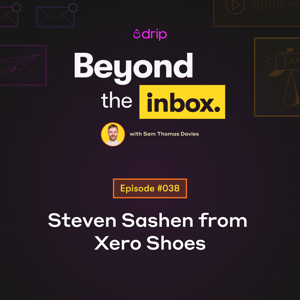
In this episode of Beyond the Inbox, Steven Sashen, the founder of Zero Shoes, joins the conversation to discuss the importance of natural motion and form in running and challenges traditional beliefs about footwear. Sashen starts by highlighting the drawbacks of cushioned shoes, explaining that they may spread out pressure but still transmit force to the body, particularly the joints. He emphasizes that comfort doesn't necessarily provide the benefits we expect.
According to Sashen, true comfort comes from allowing the body to move naturally, with muscles, ligaments, and tendons acting as springs, shock absorbers, and joint protectors. He emphasizes that running properly is not about footwear but about form. Good form feels good, while bad form hurts. Sashen adds that running barefoot allows for a more enjoyable experience when done correctly, although he doesn't recommend running completely barefoot.
Sashen appreciates a particular video that challenges the common belief that cushioning in shoes is beneficial. He enjoys responding to skeptics who only listen to the first few seconds of the video by asking them which part of his argument they disagree with, as it prompts them to consider the benefits of stronger muscles, feeling things, moving freely, and maintaining proper alignment.
The conversation delves into the challenges faced by Zero Shoes in revolutionizing the footwear industry. Sashen explains that the company is up against 50 years of shoe companies promoting shoes that may not be good or benign for foot health. He points out the negative effects of shoes with pointy toe boxes, elevated heels, and arch support, which can weaken the foot muscles over time. The goal of Zero Shoes is to challenge these deeply ingrained beliefs by being provocative and pointing out contradictions in people's own experiences.
The discussion also touches on the psychology behind changing beliefs and the importance of timing. Sashen shares how he became hyper-aware of the stories people tell and developed a knee-jerk reaction to question the opposite or seek alternative causes. He believes that now is a good time to challenge the traditional footwear narrative, as interest in barefoot shoes is growing, with more minimalist brands emerging. However, Sashen acknowledges the need to differentiate themselves in a market dominated by established brands.
The episode concludes with Sashen emphasizing that change happens when communities start adopting new ideas, and as more people question the traditional narrative, awareness spreads. He encourages individuals to explore the Zero Shoes website and find local stores carrying their products.
Overall, this episode provides valuable insights into the importance of natural motion in running and challenges the conventional beliefs surrounding footwear. Steven Sashen's passion for promoting proper form and debunking myths about cushioning and support in shoes shines through, making for an engaging and thought-provoking conversation.
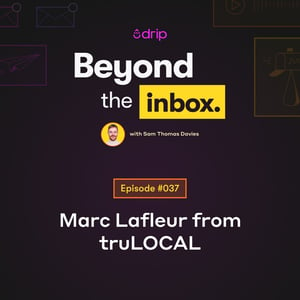
In this episode of Beyond the Inbox, host Sam is joined by Marc Lafleur, the founder of True Local. Marc shares his insights and experiences as an entrepreneur, discussing the importance of purpose, the power of marketing, and the value of building a strong team. He emphasizes the significance of having a clear purpose and dedicating oneself to becoming the best in the world at solving problems.
Marc highlights the role of intuition and following what feels right for the business. He encourages founders and team members to trust their instincts and try out ideas that align with the brand and industry. He emphasizes the importance of continuous learning and gaining inspiration from various sources such as books, podcasts, and observing the strategies of other successful entrepreneurs.
The conversation delves into the hiring process and the value of considering personality and passion over experience. Marc shares his experience of hiring sales representatives and finding that waiters and waitresses, who possess strong conversational skills and the ability to build relationships, were often more successful in sales roles than individuals with extensive experience but lacking in interpersonal skills.
The importance of creating a flat organizational structure where ideas can come from anyone within the company is also discussed. Marc emphasizes the value of crowd-sourcing ideas and involving team members from different departments, as they may offer unique insights and perspectives that can lead to innovation and success.
The episode concludes with a discussion on purpose and the fulfillment that comes from achieving a long-term goal. Marc shares his personal journey and how the sale of True Local provided a sense of fulfillment and relief. He emphasizes the importance of reevaluating one's purpose and finding new goals and passions to pursue after achieving a major milestone.
Overall, this episode of Beyond the Inbox offers valuable insights for first-time founders and entrepreneurs. It explores the significance of purpose, intuition, and building a strong team. Listeners are encouraged to embrace their purpose and dedicate themselves to solving problems, while also being open to learning from various sources and involving team members in the decision-making process.
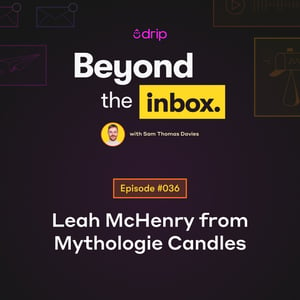
In this episode of Beyond the Inbox, host Sam interviews Leah McHenry, the founder of Mythology Candles. The conversation delves into Leah's journey as both a musician and an entrepreneur, highlighting how her experiences in the music industry have influenced her marketing strategies.
Leah emphasizes the power of vulnerability and connection in building a brand. She believes that by sharing her story and being transparent, she has been able to connect with her audience on a deeper level. Leah discusses the importance of prioritizing tasks that truly move the needle and eliminating busy work. She credits her ability to focus on impactful tasks as a key factor in managing her multiple roles, including running a seven-figure business, making music, and homeschooling her children.
One of the key insights shared by Leah is the value of creating a paid community. Mythology Candles has established a membership program called the Candle Guild, which offers exclusive access to drops, private communities, and the opportunity for members to contribute to the brand's candle creations. By providing additional benefits to their most enthusiastic customers, Mythology Candles fosters a sense of exclusivity and builds stronger relationships with their community.
Leah also discusses the significance of sample sizes in the e-commerce industry. Recognizing that purchasing fragrances online can be a risky decision for customers, she introduced sample sizes to remove that resistance. This approach has been successful in encouraging customers to try different scents and eventually upgrade to full-sized products.
The conversation further explores the use of SMS and email in capturing visitor information and nurturing customer relationships. Leah highlights the importance of building an SMS list and treating it as a separate channel from email marketing. Mythology Candles incentivizes customers to sign up for SMS notifications and provides exclusive early access and promotions to this VIP group.
Throughout the episode, Leah draws connections between her music background and her entrepreneurial endeavors. She emphasizes the value of transparency, connection, and creating unique experiences for customers. Leah also expresses her excitement for future plans, envisioning the expansion of Mythology Candles into various offshoots and exploring new avenues such as publishing and in-person mythology experiences.
Overall, Leah McHenry's journey as a musician turned entrepreneur provides valuable insights into building a successful brand. Her focus on vulnerability, connection, and prioritization serves as inspiration for entrepreneurs looking to make an impact in their respective industries.
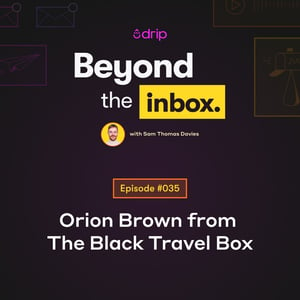
In this episode of Beyond the Inbox, host Sam welcomes Orion Brown, the founder of The Black Travel Box. The episode begins with Sam asking Orion to describe the mission behind Black Travel Box and how a trip to Japan led to its formation. Orion explains that Black Travel Box is a personal care products company specifically focused on the needs of travelers of color. She shares that her own experiences and the desire to feel and look her best while traveling inspired her to create products tailored to the unique needs of this demographic.
Throughout the conversation, Orion emphasizes the importance of self-care while traveling and the impact it can have on one's overall travel experience. She highlights the need for personal care products that cater to the diverse hair and skin types of travelers of color. Orion's background in corporate is also discussed, as she spent over 15 years in the corporate world before starting her own company. This transition allowed her to follow her passion and address a gap in the market.
The discussion explores the challenges and successes Orion faced in starting her own personal care products company. She shares insights into the needs of travelers of color and the motivation behind her brand. Orion also touches on the importance of representation in the travel industry and the positive impact it can have on individuals.
Overall, this episode provides valuable insights into the mission and journey of The Black Travel Box. Listeners gain a deeper understanding of the needs and experiences of travelers of color and the significance of self-care while traveling. Orion's story serves as inspiration for aspiring entrepreneurs and highlights the importance of addressing underserved markets.
Tune in to Beyond the Inbox to hear Orion Brown's engaging conversation with host Sam, as they explore the world of travel, personal care, and entrepreneurship.
For show notes, transcriptions, and past guests on Beyond the Inbox, please visit here. And if you enjoyed this episode, please subscribe, rate, and review the show on Apple Podcasts.

In this episode of Beyond the Inbox, Candace Cui, a growth marketer at Biotics, provides insights into the development and launch of their innovative product, Z Biotics. Candace emphasizes the importance of customer education and transparency in the health and beauty industry. She explains how Biotics aims to fill gaps in existing products by challenging common assumptions and providing solutions that enhance consumers' quality of life.
One of the key aspects of Biotics' approach is their commitment to customer-centricity. Candace describes how the company listens to customer feedback and conducts extensive testing to ensure their product meets the needs and desires of their target audience. By understanding their customers' lifestyles and preferences, Biotics is able to create a product that integrates seamlessly into their daily routines.
Candace also discusses the challenges of being a pioneer in the industry. As the first of its kind, Z Biotics requires a high level of transparency and education to build trust with consumers. Biotics takes a deliberate and informative approach to their brand storytelling, providing customers with clear and accurate information about the product's benefits and usage. By establishing themselves as a reliable and trustworthy source, Biotics aims to differentiate themselves from other brands in the health and beauty industry.
The conversation touches on Biotics' omnichannel approach to branding, which involves consistent messaging and language across various channels. Candace highlights the importance of being deliberate and consistent in their communication, avoiding overpromising and setting realistic expectations. By providing easily digestible and memorable information, Biotics ensures that their brand association remains strong and immediate in the minds of their customers.
Furthermore, Candace shares insights into Biotics' customer lifecycle and their approach to customer retention. The company focuses on delivering value and maintaining engagement through personalized email flows. By addressing customer questions and needs at different stages of the customer journey, Biotics strives to keep customers informed and satisfied.
Looking ahead, Candace discusses the future of the industry and Biotics' plans for growth. She expresses excitement about the potential of genetically engineered microbes and their ability to revolutionize human health and wellness. Biotics aims to be at the forefront of this emerging category by continuously innovating and introducing new products that address the evolving needs of consumers.
In summary, Candace Cui provides valuable insights into the development and marketing strategies behind Z Biotics. By prioritizing customer education, transparency, and brand consistency, Biotics aims to build trust, differentiate themselves in the market, and continue to deliver innovative solutions to improve the lives of their customers.
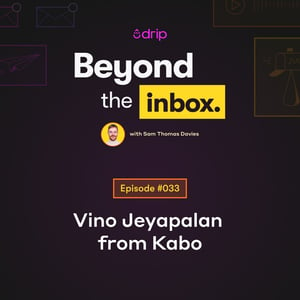
In this episode of Beyond the Inbox, Vino Jeyapalan, the founder of Kabo, a leading fresh dog food company in Canada, joins the host to discuss his entrepreneurial journey and the growth of his business. Vino emphasizes the importance of executing ideas and finding ways to scale and delegate tasks. He shares his approach to documenting processes by creating standard operating procedures (SOPs) using Google Docs or recording himself to ensure clarity and facilitate delegation.
The conversation also dives into Vino's experience appearing on Dragons Den, a Canadian TV show similar to Shark Tank. He highlights how the show provided a platform to showcase his business and connect with investors and early adopters. Vino discusses the significant impact of the show on Kabo's sales growth and the importance of having a solid distribution strategy to capitalize on such opportunities.
Vino also talks about the subsidiary brand of Kabo, PAC Freshs, which offers cold and frozen third-party logistics (3PL) services to other direct-to-consumer brands. He explains how the infrastructure they built for Kabo's distribution allowed them to expand and support other businesses in the food industry. Vino emphasizes the importance of understanding the challenges faced by these brands and using their operational and technical expertise to provide a better fulfillment experience.
The conversation further explores Kabo's marketing strategy, including the acquisition of websites like Dog Breeds List. Vino explains that these acquisitions provide touchpoints with potential customers during their research phase, allowing Kabo to nurture and educate them through email flows. He also discusses their content strategy, leveraging long-tail keywords to drive organic search traffic and build thought leadership in the pet food industry.
Looking towards the future, Vino shares Kabo's plans for product innovation, aiming to introduce new core product forms beyond fresh and dry food. They also intend to bring production in-house to enhance agility and develop new projects that delight customers and drive growth.
The episode concludes with Vino sharing where listeners can learn more about Kabo, including their Instagram page, website, and his LinkedIn profile. The host expresses gratitude for the insightful conversation and wishes Vino success in his future endeavors.
In summary, this episode provides valuable insights into Vino Jeyapalan's entrepreneurial journey, the growth of Kabo, and the strategies they have employed to scale their business. From executing ideas and delegating tasks to leveraging platforms like Dragons Den and offering 3PL services, Vino shares valuable lessons for aspiring entrepreneurs and marketers in the e-commerce space.
Show Notes
- (13:14) Vino discusses the importance of executing ideas and finding ways to scale and delegate tasks
- (13:20) Vino mentions using Google Docs and standard operating procedures (SOPs) to document processes
- (13:42) Vino talks about his experience appearing on Dragons Den and how it impacted Kabo's journey
- (14:44) Vino highlights the benefits of Dragons Den as a platform for meeting investors and reaching early adopters
- (15:50) Vino shares the challenges and opportunities of participating in Dragons Den during the COVID-19 pandemic
- (16:46) Vino discusses the preparation and nerves involved in pitching on Dragons Den
- (17:43) Vino reveals the positive impact of appearing on the show on Kabo's sales growth
- (18:51) Vino introduces PAC Freshs, Kabo's subsidiary brand offering 3PL services in the food industry
- (19:39) Vino explains how PAC Fresh leverages Kabo's infrastructure and operational expertise to support other brands
- (20:24) Vino discusses the advantages of PAC Freshs in terms of reduced costs and improved last-mile logistics
- (21:36) Vino emphasizes the importance of distribution and the role it plays in growth
- (22:12) Vino explains the acquisition of dogbreedslist.com and how it fits into Kabo's marketing strategy
- (22:41) Vino talks about using content to educate and nurture their audience, as well as improve SEO rankings
- (23:24) Vino shares the strategy behind acquiring dogbreedslist.com and utilizing its traffic to drive conversions
- (24:12) Vino discusses the importance of thought leadership and building trust with customers
- (25:08) Vino mentions the optimization of email lists and segmentation as part of their email marketing strategy
- (26:12) Vino explains the role of content in nurturing their audience and driving organic search traffic
- (26:43) Vino discusses Kabo's future plans, including expanding product forms and bringing production in-house
- (28:45) Vino highlights the growth and potential of PAC Freshs in supporting other direct-to-consumer brands
- (29:46) Vino shares the excitement of working with other brands and the benefits of collective growth
- (30:28) Vino discusses the focus on innovation and expanding distribution across Canada
- (30:58) Vino provides information on where listeners can learn more about Kabo
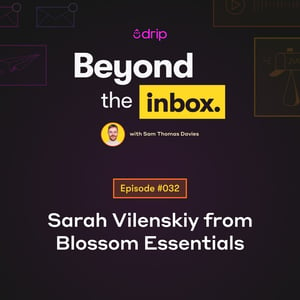
In this episode of Beyond the Inbox, Sarah Vilenskiy, the founder of Blossom Essentials, joins us to share valuable insights into her marketing strategies. She discusses her approach to Facebook advertising, email marketing, and influencer marketing. Sarah emphasizes the importance of content organization and provides advice for e-commerce founders on self-care and mental health.
Sarah starts by talking about her focus on customer feedback and the importance of understanding the issues customers face and how her products can help them. She mentions that rather than using before and after photos, she relies on customer testimonials and reviews to showcase the effectiveness of her skincare brand.
When it comes to the marketing strategy, Sarah discusses the debate within her team about whether to focus on subscriptions or one-time purchases. She explains that while they do have subscribers, their best-selling product, the hydration repair honey cell, takes a long time to finish, which makes it challenging to push for subscriptions. She emphasizes the importance of understanding the product and its usage cycle when deciding on the subscription model.
Sarah also dives into their email marketing strategy, highlighting the inclusion of educational content in their email flows. They focus on providing value to their customers through self-care, health, mindfulness, and wellness tips, ensuring that using their products enhances the overall well-being of their customers.
When it comes to user-generated content, Sarah shares her experience with influencers and explains that she had little success with influencer marketing. Instead, she found that reaching out to customers who posted positive experiences on social media and offering them incentives to create videos resulted in better content and more authentic testimonials. She also mentions working with an agency for a rebranding campaign, which allowed them to create focused and effective content aligned with their Facebook strategy.
Sarah highlights the importance of content organization and having a well-organized Google Drive to store and easily access all the content they create. She emphasizes the value of repurposing content and the need for an organized system to manage and find content quickly.
When discussing partnerships, Sarah expresses her skepticism about influencer marketing and the lack of results she has seen from it. She advises entrepreneurs to focus more on creating good content rather than relying on influencers with large followings. She believes that niche micro-influencers with engaged audiences can be more effective in driving conversions.
In terms of future growth, Sarah mentions the importance of finding a second-best-selling product to scale their Facebook advertising. She also talks about their focus on retail expansion and exploring online marketplaces to diversify their channels.
Sarah concludes the podcast by emphasizing the need for self-care and mental health in the entrepreneurial journey. She encourages entrepreneurs to normalize the challenges they face and to take time off when needed. She also shares her personal coping mechanism, which is working out, and highlights the importance of finding what works for each individual.
Overall, Sarah Vilenskiy provides valuable insights into her marketing strategies and offers advice for e-commerce founders. Her focus on customer feedback, content organization, and self-care serves as an inspiration for entrepreneurs looking to build successful and sustainable businesses.
Show Notes
- (0:00) Introduction to Sarah Vilenskiy and Blossom Essentials
- (2:12) Sarah's focus on customer feedback and testimonials
- (3:40) Debating between subscriptions and one-time purchases
- (5:05) The importance of understanding the product and its usage cycle
- (6:28) Email marketing strategy with educational content
- (7:53) Using incentives to generate user-generated content
- (10:30) Working with an agency for a rebranding campaign
- (12:00) Importance of content organization and repurposing
- (14:07) Skepticism towards influencer marketing
- (16:40) Niche micro-influencers and the value of good content
- (19:05) Future growth plans and retail expansion
- (21:12) Self-care and mental health in entrepreneurship
- (23:30) Coping mechanism: working out
- (25:42) Importance of normalizing the challenges of entrepreneurship
- (27:35) Investing in therapy for co-founders and relationship dynamics
- (28:54) Conclusion and where to learn more about Blossom Essentials
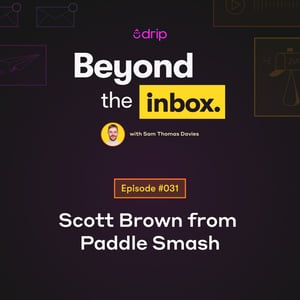
In this episode of Beyond the Inbox, Scott Brown, co-founder of Paddle Smash, joins the show to discuss the journey of bringing their outdoor game to market. Paddle Smash combines elements of pickleball and Spikeball, targeting the pickleball-loving parent niche. Scott shares insights into their marketing strategy and the role user-generated content plays in driving brand awareness and customer acquisition.
Scott discusses the initial goal of getting a thousand Paddle Smash sets out into the world. They utilized email marketing, social media, and social ads to promote the game. Social ads proved to be the most effective method, showcasing people playing the game and generating interest. They also focused on sampling, reaching out to influencers in the pickleball and Spikeball spaces, allowing them to play the game and share their experiences. Scott emphasizes the power of finding the right person to create a hotbed of activity around the product.
The conversation shifts to email marketing and customer journey. Paddle Smash incentivizes email exchanges for a chance to win a free product, gathering email addresses and engaging with potential customers. Different flows are created based on how customers enter their database, whether through immediate interest or signing up for newsletters or giveaways. Hot leads receive promotion codes, and customers who leave items in their carts receive follow-up emails with promo codes to sweeten the deal. Additionally, Paddle Smash focuses on providing a good post-purchase experience, sending emails with instructions and videos to help customers learn the game and ensure a positive experience.
Building brand loyalty is a priority for Paddle Smash. While they are currently a one-product company, they are looking for ways to turn customers into loyal brand ambassadors. They have experimented with an ambassador program, but are still figuring out the best approach. Scott mentions that influencers with existing audiences may be more likely to benefit from affiliate links and promotions.
Scott dives into their target audience, primarily pickleball-loving parents. The game appeals to pickleball players who are eager for anything related to the sport and have a higher willingness to invest in products that enhance their gameplay. Pickleball players tend to be older, more affluent, and willing to spend significant amounts on equipment. Scott highlights the growth potential in the pickleball and outdoor games industries, mentioning the increasing popularity of pickleball and the enduring interest in outdoor activities post-pandemic.
Looking ahead, Paddle Smash plans to focus on social ads and user-generated content in 2023. They aim to solicit authentic videos from fans, leveraging the rawness and authenticity of TikTok-style content. Partnerships with professional pickleball players and retail expansion are also on the horizon. Scott mentions the success of their partnership with Dick's Sporting Goods and their plans to collaborate with summer camps and educational institutions.
In summary, this episode provides valuable insights into the marketing strategies and trends in the outdoor games industry. Scott's journey with Paddle Smash showcases the power of user-generated content, partnerships, and targeting niche audiences to drive brand awareness and customer loyalty.
Show Notes
- (00:00): Introduction and guest bio
- (02:30): Scott's journey of bringing Paddle Smash to market
- (06:45): Marketing strategies and challenges in the outdoor games industry
- (10:26): Initial order and marketing efforts to get a thousand sets out into the world
- (11:17): The impact of user-generated content and the power of influencers
- (12:01): Email marketing campaigns and customer journey
- (13:12): Different flows based on customer interest and engagement
- (14:05): Focus on providing a good experience and customer support for the first thousand customers
- (14:45): Building brand loyalty and turning customers into ambassadors
- (16:14): Exploring potential partnerships and collaborations
- (17:16): Target audience identification and marketing strategy development
- (19:12): The growth potential of pickleball and outdoor games
- (20:08): Staying ahead of the curve and future plans
- (23:33): Collaborating with professional pickleball players and ambassadors
- (25:24): Doubling down on social ads and user-generated content in 2023
- (28:08): Expanding into retail and targeting specific niche markets
- (29:00): Where to learn more about Paddle Smash and promo code for listeners
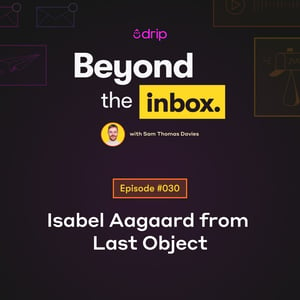
In this episode of Beyond the Inbox, Sam interviews Isabel Aagaard, co-founder and CEO of Last Object, a sustainable brand that creates reusable alternatives to single-use items. Isabel shares her journey with Last Object, the company's marketing strategies, and the future of sustainability.
Isabel shares that Last Object was born out of the need for a sustainable solution to single-use cotton swabs. The brand expanded its product line to include reusable cotton rounds, washable menstrual pads, and other eco-friendly personal care products. Isabel emphasizes the importance of creating products that are not only sustainable but also practical and beautiful.
Sam and Isabel discuss Last Object's marketing strategies, which include Facebook and Instagram ads, TikTok reels, Google ads, PR podcasts, and collaborations with other eco-friendly brands. Isabel shares that the company has shifted its focus to growing its email list and partnering with other B Corp-certified brands.
The conversation then shifts to sustainability and the future of the industry. Isabel believes that sustainability will become the new normal and that future generations will look back at single-use items with disgust. She emphasizes the importance of understanding the different aspects of sustainability, such as water consumption and microplastic waste, and making the right choice possible.
Finally, Isabel shares her vision for Last Object's future, which includes expanding its product line to include more advanced reusable alternatives to single-use items. She emphasizes the importance of creating a green company that is built on goodness and has a bigger mission beyond profit.
Overall, the episode provides valuable insights into Last Object's sustainable business model and marketing strategies, as well as the importance of understanding sustainability in all its aspects.
Show Notes
- (00:00) Introduction
- (00:45) About Last Object
- (02:45) Creating the reusable swab
- (05:00) The importance of sustainability
- (07:55) The success of the reusable swab
- (09:24) The value proposition of Last Object products
- (10:07) Other Last Object products
- (12:19) The shift in perspective after becoming a parent
- (14:44) Acquiring new customers for Last Object
- (16:52) Building community around Last Object
- (18:56) Email marketing and language localization
- (23:43) Customer lifecycle at Last Object
- (25:07) Driving customer reviews
- (26:10) What sets Last Object apart
- (27:53) The future of sustainability
- (29:21) Long-term goals for Last Object
- (31:20) Conclusion and where to learn more

In this episode, Jake Karls, co-founder of Mid-Day Squares, a better-for-you chocolate bar company, shares his insights on building a brand that's authentic and relatable. He emphasizes the importance of storytelling, authenticity, and product-market fit in building a loyal fanbase.
Karls also talks about the challenges of running a business with family members and how in-house therapy sessions have been essential to maintaining healthy partnerships and scaling the business. He explains that therapy allows them to have difficult conversations in a safe zone and work through deep issues they have with each other or the business. The cost of in-house therapy sessions is around $50-70k per year, but Karls believes it's worth the investment.
He shares the story of the Hershey's lawsuit, which threatened to sue Mid-Day Squares for using the color orange on their packaging. Instead of backing down, Mid-Day Squares used their strength in storytelling to create a music video and show the irony of Big Chocolate going after a small company. This boldness ended up rewarding them as the video went viral, and they received lots of press, and their consumers loved it.
Karls believes that authenticity creates relatability, which in turn creates trust. He advises businesses to invest in creators, editors, and videographers to build a media team within their organization. He encourages everyone to share their story and not be scared to do so. Everyone has a story, and being authentic and relatable is what builds a community that's a fan of your story.
Karls also talks about the importance of building a strong executive team to scale the business. Mid-Day Squares is currently in the process of building out their executive team to scale to the $100 million mark in revenue over the next three years.
Overall, this episode provides valuable insights into building a successful business that's authentic, relatable, and focused on product-market fit. It highlights the importance of storytelling, authenticity, and therapy in building healthy partnerships and scaling a successful business.
Show Notes
- (00:00) Introduction
- (01:15) Jake's background and Mid-Day Squares
- (03:23) Building a brand that's authentic and relatable
- (05:36) Importance of product-market fit
- (07:22) Challenges of running a business with family members
- (09:57) Benefits of in-house therapy sessions
- (12:39) Hershey's lawsuit and using storytelling to respond
- (16:23) Advice for businesses with limited marketing budgets
- (18:21) Building a media team within your organization
- (20:39) Mid-Day Squares' future plans
- (23:22) Building a strong executive team
- (25:05) Jake's inclusion in Forbes 30 Under 30
- (26:00) Outro and where to learn more about Mid-Day Squares
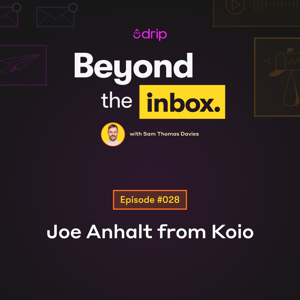
In this episode of Beyond the Inbox, Joe Anhalt, the Director of Growth Marketing at Koio, joins the show to discuss what it takes to build a successful brand online. Anhalt explains that Koio's product offering is not necessarily differentiated from its competitors, so the brand must beat everyone at their own game. To do this, Koio focuses on handcrafted, versatile designs and tells that story better than its competitors. Anhalt emphasizes the importance of understanding user data, asking questions, and reinforcing answers across all marketing initiatives and retail stores.
Anhalt reveals that Koio's biggest return on investment for marketing dollars is still meta and Facebook. The brand experimented with other channels, such as newsletters, direct mail, and social ads, but the big unlock was visually communicating the brand values through macro shots, showcasing its craftsmanship and quality. Anhalt suggests that landing people further up the funnel is more effective because landing them on the product page doesn't drive as many conversions. Koio has had success with landing pages for larger collections, where they can tell a story and do more selling.
Anhalt notes that Koio does a good job of email capture and SMS. The brand focuses on segmentation and treating VIP customers like VIPs, providing early access to product drops that customers appreciate. When a customer makes a purchase, their second purchase is more likely to be the same product in a different color or the exact same product. Anhalt explains that Koyo's best sellers keep the lights on, and doubling down on that core product offering is essential. Koyo captures most of its referral traffic from YouTube, where people do their research and due diligence. Anhalt admits that some of those videos are paid, but YouTube has been a solid channel for Koyo's core demographic.
Anhalt reveals that Koio is launching a new sub-brand that is vegan and has a more attainable price point to widen the aperture of the brand's customers and demographic. The new brand will live under the Koyo umbrella and is a startup within a startup. Anhalt is excited to see how customers will react to this new initiative.
Overall, the episode offers valuable insights into Koio's marketing strategy, emphasizing the importance of understanding user data and creating a consistent brand message across all marketing initiatives. Anhalt's experience in the ecommerce industry provides a wealth of knowledge for building a successful brand online.
Show Notes
- (0:00): Joe talks about how Koio needs to beat everyone at their own game and focus on handcrafted, versatile designs.
- (1:17): Sam suggests that being consistent in communicating brand values over time can be a differentiator for Koio.
- (2:56): Joe discusses Koio's most effective marketing channels, including Meta and Facebook.
- (5:08): Joe explains that Koio sends most of its traffic to the homepage and is getting creative with homepage experiences and landing pages.
- (7:33): Sam asks about Koio's onsite marketing strategy, and Joe discusses the brand's email and SMS capture.
- (10:39): Sam asks about Koio's buyer behavior, and Joe explains that customers often buy the same product in a different color.
- (14:12): Sam asks about Koio's referral marketing strategy, and Joe explains that YouTube is a crucial channel for the brand.
- (15:59): Joe discusses Koio's new sub-brand, which will be launched next month and will be at a lower price point, vegan, and more fun and lighthearted.
- (18:49): Joe wraps up the episode and mentions where listeners can learn more about Koio.
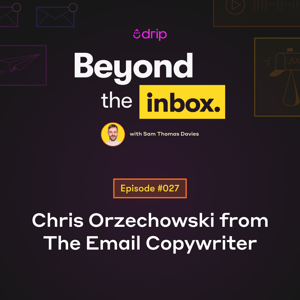
In this episode, Sam takes a deep dive into the world of email marketing with renowned email copywriter Chris Orzechowski. Chris shares his insights on the changing landscape of email marketing, the importance of storytelling in email copy, and the metrics that matter most in measuring email marketing success.
Chris begins by discussing the evolution of email marketing, noting that while the basic principles remain the same, the tactics and strategies used have evolved over time. He emphasizes the importance of building personal connections with subscribers and creating engaging content that resonates with them. According to Chris, email marketing is all about building trust and establishing a personal connection with subscribers.
One of the key ways to do this is through storytelling. Chris explains that storytelling is a powerful tool in email marketing that helps to build a personal connection with subscribers. He encourages brands to tell stories in their emails that are intriguing and interesting to their subscribers. Even seemingly mundane events, such as a fishing trip, can be turned into compelling stories that engage subscribers and keep them coming back for more.
Chris also emphasizes the importance of metrics in measuring email marketing success. He recommends focusing on earnings per subscriber as the most important metric to track, as it takes into account all aspects of email marketing, including open rates, click-through rates, and sales. He also encourages brands to focus on placed order rates as a key metric for email automation.
Finally, Chris offers his thoughts on the role of artificial intelligence (AI) in email marketing. While he sees the potential benefits of AI, he cautions that it is not a replacement for human creativity and personal connection. He recommends using AI as a tool to enhance creativity and streamline processes, but not as a replacement for human connection and storytelling.
Overall, Chris provides a wealth of insights and practical advice for brands looking to improve their email marketing efforts. Whether it's through storytelling, metrics, or AI, Chris emphasizes the importance of building personal connections with subscribers and creating engaging content that resonates with them.
Show Notes
- (0:00) Introduction
- (0:57) Chris Orzechowski's background and journey as an email copywriter
- (3:25) How email marketing has changed over the years
- (6:22) The importance of storytelling in email marketing
- (9:03) Using personal stories to connect with your audience
- (11:22) The role of brand identity in email marketing
- (13:28) The importance of personalization in email marketing
- (15:04) Using characters and personalities in email marketing
- (18:01) Writing compelling subject lines
- (21:10) Metrics that matter in email marketing
- (23:17) The role of AI in email marketing
- (29:01) The limitations of AI in storytelling and email marketing
- (30:03) Outro and where to learn more about Chris Orzechowski's work
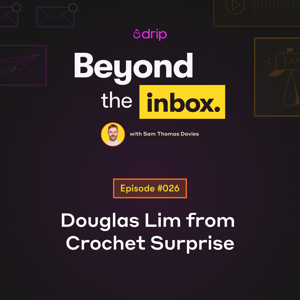
In this episode of Beyond the Inbox, host Sam interviews Douglas Lim, co-founder of Crochet Surprise and Sub Amplify. Lim shares his insights on building a successful e-commerce business, including the importance of building a community with customers, becoming the face of the brand, and the challenges of marketing in the subscription box and e-commerce industries.
Lim highlights the importance of building a close relationship with customers in order to create a community. He and his wife did all the customer service for their subscription box business for the first two years to get to know their customers and add a personal touch to their interactions. By doing so, they were able to turn customers into raving fans and build a strong community.
Another key takeaway from the interview is the importance of being the face of the brand. Lim stresses that customers want to buy from people they know, like, and trust and that founders should take advantage of this by becoming the face of their brand. He cites Steve Jobs as an example of someone who did this successfully by telling a story and becoming the face of the brand during product presentations.
Lim also discusses the challenges of marketing in the subscription box and e-commerce industries. He notes that profit margins are lower in the subscription box industry due to the expectation of high value for a low price and that paid advertising costs have gone up, making it even harder to make a profit. To overcome these challenges, Lim and his team have pivoted to a paid community membership model, which they believe will be the future of e-commerce marketing.
The podcast also delves into Lim's insights on email marketing and how it is a cost-effective way to reach customers. He emphasizes the importance of planning email campaigns during certain periods of the year, such as Mother's Day, Black Friday, and Cyber Monday, and using Facebook ads and organic marketing to promote their products.
Throughout the interview, Lim shares his experiences with running Crochet Surprise and Sub Amplify and highlights the differences between the physical product and software industries. He emphasizes the importance of balancing marketing efforts between the two brands and delegating responsibilities to team members.
The episode concludes with Lim discussing his plans for the future of Crochet Surprise and Sub Amplify and the trends he sees in the subscription box and e-commerce industries. He notes that physical product-based businesses, like subscription boxes, will continue to face challenges due to the lower profit margins and increased competition. However, he sees a future in paid community membership models, which will provide customers with a more personalized experience and allow businesses to build stronger relationships with their customers.
Overall, this episode offers valuable insights into building a successful e-commerce business, with a focus on building a community, becoming the face of the brand, and adapting to changes in the industry. It is a must-listen for anyone interested in e-commerce and subscription box businesses.
Show Notes
- (00:00) Introduction
- (01:14) Douglas Lim's background and experiences with Crochet Surprise and Sub Amplify
- (03:00) Becoming the face of the brand and building a community with customers
- (05:30) The challenges of marketing in the subscription box and e-commerce industries
- (08:08) The benefits of using email marketing
- (10:19) Sub Amplify and pivoting to the paid community membership model
- (16:02) Overcoming challenges in driving reviews for the app
- (17:39) Balancing marketing between the two brands
- (20:22) Managing a small team and delegating responsibilities
- (24:54) Future plans for Crochet Surprise and Sub Amplify and trends in the subscription box and e-commerce industries
- (27:50) Outro and where to find Douglas Lim
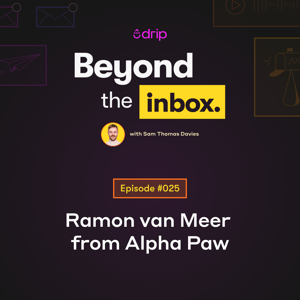
In this episode of Beyond the Inbox, Sam talks with Ramon Van Meer, CEO and founder of Alpha Paw, about marketing tactics and strategies for their pet products e-commerce business. Ramon shares his expertise in content marketing, email campaigns, and differentiation strategies.
Ramon discusses the challenges faced by his company during the COVID-19 pandemic and how they adapted to changes in the pet industry. He also delves into the importance of focusing on bottom-line profitability and staying lean in order to weather macroeconomic changes.
One of the key marketing tactics that Ramon discusses is content marketing. He explains that Alpha Paw created a blog with different guides for different dog breeds, which helped drive traffic to their website through SEO. However, he admits that the conversion rate of the blog traffic was not very good, so they pivoted to lead generation for pet insurance companies and monetized the traffic through display banner ads.
Ramon also talks about the importance of email campaigns and automation. He explains that they have different automations in place depending on what product a customer buys, and they also send newsletters and reminders for reordering products. He emphasizes the importance of staying on point with email campaigns and creating campaigns that address specific pain points of pet owners.
Another marketing strategy that Ramon discusses is differentiation. He explains that Alpha Paw tried to create breed-specific mini-websites, but the backend of the operations was a nightmare. Instead, they decided to focus on fewer products with more depth to them. He emphasizes the importance of understanding the specific pain points of customers and creating products and messaging that address those pain points.
Finally, Ramon talks about how he stays up-to-date with marketing trends and tactics. He mentions following Nick Sharma on Twitter and reading his newsletter, as well as being in WhatsApp groups with other founders where they share marketing insights and strategies.
Overall, Ramon provides valuable insights into the world of pet product e-commerce and the importance of marketing tactics such as content marketing, email campaigns, and differentiation. He also emphasizes the importance of staying lean and focusing on profitability in uncertain times.
Show Notes
- (00:00) Introduction
- (00:53) Ramon Van Meer's background and Alpha Paw's mission
- (02:40) Rebranding Alpha Paw to Paw Ramp
- (04:20) Conversion rates and the importance of understanding user needs
- (05:17) Conversion rate from first-time visitor to first-time customer
- (06:25) Alpha Paw's content strategy and guides for different dog breeds
- (08:11) Monetizing traffic through lead generation for pet insurance companies and display banner ads
- (09:50) Alpha Paw's marketing strategy and addressing specific pain points for dog owners
- (12:41) Alpha Paw's email marketing tactics and automation
- (16:34) Email campaigns and Mother's Day campaign
- (18:25) Ramon Van Meer's role in Alpha Paw and focusing on growth marketing
- (19:58) Marketing people Ramon Van Meer looks up to and staying abreast of new trends
- (21:41) COVID-19's impact on Alpha Paw and adapting to changes in the pet industry
- (24:12) Alpha Paw's focus on fewer products with greater depth
- (27:24) Staying lean and focusing on channels that companies own
- (28:28) Where to learn more about Alpha Paw
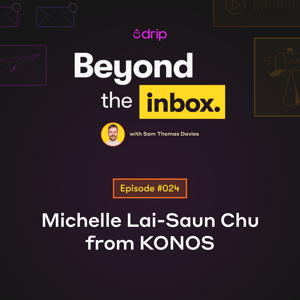
In this episode of Beyond the Inbox, host Sammi Reinstein interviews Michelle Lai-Saun Chu, the founder, and owner of KONOS, a company that produces healthy and delicious dog treats. Michelle shares her journey to becoming a small business owner, the challenges she has faced along the way, and how she has built a community around her brand. She also talks about her passion for dog training and the direction she sees her business taking in the future.
Michelle began by discussing her journey to entrepreneurship, which started with her desire to create healthy, tasty dog treats for her own dog, Kono. She quickly realized that there was a gap in the market for high-quality, nutritious dog treats and decided to launch her own business. Michelle faced numerous challenges along the way, including developing recipes, sourcing ingredients, and navigating the legal requirements for pet food production.
Despite these obstacles, Michelle was determined to create a business that not only provided great products but also empowered dog parents and built an inclusive community. Michelle discusses the importance of building a community that not only loves the products but also believes in the mission of the brand. She highlights the value of having a community that shares experiences and provides support to each other.
One of the ways Michelle has built her community is through her Discord channel, which she started to provide a space for her customers to connect with each other. Michelle discusses the importance of having an online space where people can connect, share resources, and support each other, especially for those who may not have access to dog training resources in their area.
Sammi and Michelle also discuss the role of community in marketing strategy and customer retention. Michelle emphasizes the importance of having a community that is a thousand percent behind the mission and values of the brand, which leads to high customer return rates.
In terms of marketing strategy, Michelle discusses the effectiveness of email marketing and the importance of consistency. She also emphasizes the value of building relationships with other small businesses and supporting women of color in the industry.
Finally, Michelle shares her vision for the future of KONOS, which includes becoming a training lifestyle brand that empowers people to train their dogs and live a better life with them. She discusses the challenges of balancing product development, sales, marketing, and content creation as a small business owner but emphasizes the importance of consistency and showing up every day.
Overall, this episode provides valuable insights into entrepreneurship, community building, and marketing strategy and is a must-listen for anyone interested in starting their own business or building a strong brand.
Show Notes
- (00:00) Introduction
- (01:47) Michelle's background and journey to entrepreneurship
- (03:56) Challenges faced in starting a pet food business
- (06:07) How Michelle built a community around her brand and the importance of community
- (08:37) Discord community and its role in supporting dog parents
- (10:26) Marketing strategy and the effectiveness of email marketing
- (12:45) Michelle's approach to social media content and the importance of consistency
- (15:35) Customer acquisition and the importance of list building
- (17:48) Michelle's commitment to uplifting women of color
- (22:16) The role of community in marketing strategy and customer retention
- (24:20) Michelle's vision for the future of KONOS
- (26:30) Conclusion
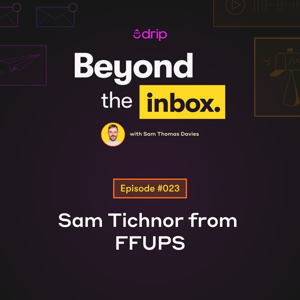
In this episode of Beyond the Inbox, host Sam shares his conversation with Sam Tichnor, the founder of FFUPS, a snack brand that focuses on fun and flavor. Tichnor discusses his approach to building a unique snack brand and shares his thoughts on marketing, product development, and the challenges and opportunities he's faced along the way.
Tichnor begins by discussing his approach to building a DTC brand in the snack industry. He highlights the importance of creating a flagship store online, where customers can purchase in bulk and get a fair price, while also using the website as a way to showcase the brand and excite potential customers. Tichnor notes that the website should be less salesy and more focused on building awareness and interest. He also shares his thoughts on the importance of meeting consumer needs and understanding the market.
Tichnor then discusses his unusual approach to retail. Rather than starting in retail and moving to DTC, FFUPS was launched exclusively on their website. Tichnor states that the decision was based on his lack of industry connections and the operational difficulties of executing well in a grocery store. Tichnor emphasizes the importance of listening to the consumer and understanding how they want to interact with the product. In FFUPS' case, customers preferred to buy in-store rather than buy in bulk online. Tichnor explains that by going in with their eyes open, FFUPS has been able to slowly build distribution and expand into retail.
Tichnor also discusses the challenges of driving repeat sales through email marketing. He notes that while email is an important way to educate customers about the brand, it's important to strike a balance between educating customers and driving sales. Tichnor emphasizes the importance of treating email marketing as brand exposure and brand building, rather than just a way to drive sales.
Tichnor concludes by discussing FFUPS' future plans. He states that the brand wants to be everywhere people buy snacks, and that they hope to become the next iconic snack brand. He emphasizes that FFUPS wants to own the flavored puff category and that they're not interested in expanding their product portfolio across multiple categories. Tichnor also shares his thoughts on trends in the food and beverage industry, noting that while some trends are important to follow, it's also important to ignore trends and focus on what's real and what the brand stands for.
Overall, Tichnor provides insight into how to build a successful DTC snack brand and emphasizes the importance of understanding consumer needs, staying true to the brand, and slowly building distribution to expand into retail.
Show Notes
- (00:00) Introduction
- (00:45) Sam's background and the founding of FFUPS
- (04:43) The role of DTC in FFUPS's business model
- (11:50) The benefits of launching in retail before DTC
- (13:03) Balancing repeat sales with natural consumer behavior
- (15:00) Using email marketing for brand exposure and education
- (16:50) Sam's approach to influencer marketing
- (18:27) Successful marketing campaigns and strategies
- (22:41) Expanding the FFUPS team
- (24:12) Trends and changes in the food and beverage industry
- (27:28) FFUPS's vision for the future
- (29:00) Outro and where to learn more about FFUPS
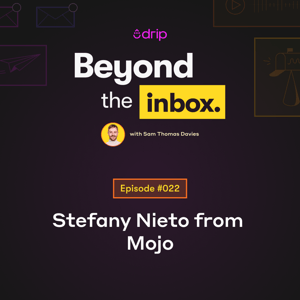
In this episode of Beyond the Inbox, host Sam and guest Stefany Nieto, the co-founder and CEO of Mojo, discuss the challenges and successes of marketing and selling microdose gummies in the wellness industry.
Stefany shares her insights on Mojo's marketing strategy, which involves targeting both advocates for microdosing and those who are not solution-aware. She emphasizes the importance of convenience, taste, and form factors in differentiating Mojo's products from those of competitors. However, she also notes the challenges of copywriting for social media platforms, which frequently update their community guidelines and restrict what brands can say about their products.
The conversation then shifts to Mojo's retail strategy, including the challenges of expanding into retail stores and the importance of being involved in community events. Stefany also shares the story of how Mojo has helped customers who have been scammed by fake dealers posing as Mojo distributors on social media platforms.
Stefany shares her insights on Mojo's marketing strategy, which involves targeting both advocates for microdosing and those who are not solution-aware. She emphasizes the importance of convenience, taste, and form factors in differentiating Mojo's products from those of competitors. However, she also notes the challenges of copywriting for social media platforms, which frequently update their community guidelines and restrict what brands can say about their products.
Show Notes
- (00:00) Introduction
- (01:17) Stefany Nieto's background and how Mojo got started
- (03:45) The changing public perception of psychedelics
- (07:30) The resurgence of alcohol brands and other vices
- (08:46) Mojo's marketing strategy and its evolution over time
- (09:52) The challenges of marketing on social media platforms such as TikTok
- (11:05) Mojo's target audience and how the company speaks to different types of customers
- (12:46) The customer journey when visiting Mojo's website for the first time
- (14:22) Mojo's subscription strategy and challenges in acquiring new subscribers
- (15:50) Strategies for acquiring new customers, including micro-influencers and retail expansion
- (16:48) The issue of scammers using Mojo's content to sell illegal products
- (20:29) How Mojo differentiates itself from other mushroom-based wellness products
- (22:33) The challenges of copywriting when marketing Mojo's products
- (23:45) Mojo's goals for the year, including retail expansion and new product innovations
- (25:48) The challenge of increasing Mojo's Amazon rating and strategies for doing so
- (26:59) Where listeners can go to learn more about Mojo
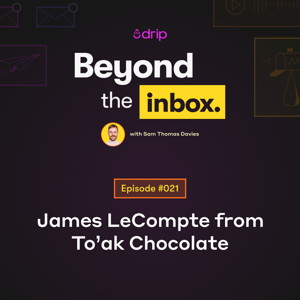
In this episode of Beyond the Inbox, Sam interviews James Le Compte, CEO of To’ak Chocolate, a luxury chocolate brand that focuses on sustainability and social impact. James begins by discussing the company's mission to create the world's most valuable chocolate, not in terms of price but in terms of the value it delivers to farmers, the environment, and consumers. He also talks about the ideal buyer for their products, which tends to be connoisseurs interested in learning about the origins and craft behind the brand.
Next, Sam and James discuss the company's marketing strategy and how it has evolved over time. James notes that they have had to take a non-traditional approach to luxury branding, as they do not have the resources for flagship retail stores or experiences. Instead, they have leveraged the digital channel, focusing on email, PR, and content marketing. James also talks about their post-purchase survey, which has been valuable for collecting data on customer feedback.
The conversation then moves on to discussing To’ak Chocolate's sustainability efforts. James explains that the company is a benefit corporation with stated social and environmental impacts. They have developed partnerships with other organizations to scale their impact, such as their project with Third Millennium Alliance to support regenerative agriculture in Ecuador.
Finally, James shares some insights into the future of To’ak Chocolate's marketing strategy. They plan to focus on tapping into their existing customer base and launching a loyalty program that offers rewards from other Ecuadorian brands. James emphasizes the importance of partnerships in scaling their impact and achieving their sustainability goals.
Overall, this episode offers valuable insights into how a luxury brand can balance growth with sustainability and social impact, To’ak Chocolate's non-traditional approach to marketing and focus on partnerships serves as a model for other companies looking to make a positive impact while still achieving success.
Show Notes
- (00:00) Introduction
- (01:15) James Le Compte's background and how he got involved with To’ak Chocolate
- (03:45) The mission of To’ak Chocolate and the value it delivers
- (06:49) Ideal buyer and target audience
- (08:20) Ideal consumers and their interests
- (09:54) Marketing strategy evolution and successful channels
- (12:26) Welcome flow for first-time buyers and the ideal interaction
- (13:42) Bringing in customers at the low price point and upselling
- (15:36) Subscription model and plans to incentivize subscriptions
- (16:49) Successful channels, including post-purchase survey and PR
- (19:02) Correlation between high-quality backlinks and the quality of customers
- (21:42) Educational content on the website and its purpose
- (23:30) Focusing on existing customers in 2023 and launching a loyalty program
- (25:54) Balancing growth and sustainability and the importance of partnerships
- (28:48) Where to learn more about To’ak Chocolate and its products

In this episode of Beyond the Inbox, Keta Burke-Williams, CEO and founder of Ourside, shares her journey of building a luxury fragrance brand from the ground up. She discusses the challenges and successes she has experienced as a small business owner, as well as her insights on marketing strategies, including the use of micro-influencers and email campaigns.
Keta explains how her experience as a figure skater and an entrepreneur share similarities in terms of the journey is a lonely one. She also highlights the importance of perseverance and creativity in both fields. When asked about the marketing strategies that have been most successful for Ourside, Keta mentions word of mouth and email campaigns, which have been effective in growing their community and building brand awareness. The company has also started working with micro-influencers, which Keta believes is a great way to get real feedback from customers and build brand evangelists.
Keta shares that one of the challenges they've faced is the conversion rate to full-sized purchases. They had a lot of people who were interested in learning more about the brand but didn't necessarily convert to full-sized purchases. To combat this, Ourside created a discovery kit, which has been successful in getting more people to try their fragrances and eventually make purchases. They are also exploring the idea of subscriptions and memberships, but Keta emphasizes the importance of collecting information and understanding what customers get from the brand beyond just the products before creating such programs.
In terms of branded content, Keta admits that it's been a challenge to ensure everything aligns with the messaging. The company has been primarily focused on creating high-quality content that resonates with its community while also partnering with micro-influencers to leverage its content. Keta also shares that she recently hired an intern who is a content creator to help with this aspect of the business.
Overall, Keta's insights highlight the importance of building a strong community and understanding what customers want from the brand. Ourside’s success can be attributed to its focus on word of mouth, email campaigns, and micro-influencers, as well as its dedication to building a brand story that resonates with its customers.
Show Notes
- (08:44): Sam asks Keta about the similarities and differences between being an athlete and an entrepreneur.
- (08:58): Keta responds that both can be very lonely journeys and require perseverance and creativity.
- (09:48): Keta adds that the creativity piece is the third similarity between being an athlete and an entrepreneur.
- (10:21): Sam transitions into asking about Ourside’s marketing strategy.
- (10:29): Keta shares that word of mouth and email campaigns have been successful in growing their community and building brand awareness.
- (11:16): Keta mentions that they are excited to lean more into building community through micro-influencers and nano-influencers.
- (11:58): Keta explains that they find micro-influencers that are a good fit by looking at other brands that share similar values or have a clear point of view.
- (12:55): Keta defines micro-influencers as those with between 2,000 and 10,000 followers who have good engagement rates.
- (13:51): Keta talks about their approach to growing their email list and collecting data on what kind of content their audience responds to.
- (14:39): Keta mentions that their approach to turning first-time customers into repeat buyers is still evolving, and they are collecting information to understand what a meaningful subscription or membership program would look like.
- (15:32): Keta explains that they use forms and pop-ups to collect emails on their website and are AB testing different offers to see what works best.
- (16:23): Keta talks about their discovery kit, an introductory product for people to try all three fragrances and get a sense of the brand.
- (17:37): Keta shares that they are still trying to figure out what kind of subscription or membership program would be interesting to their customers.
- (18:25): Keta explains that one of the challenges they've faced is the conversion rate to full-sized purchases.
- (19:50): Keta discusses the challenge of balancing their focus on being an omnichannel brand and how it will continue to bolster its D2C channel while also doing well in retail.
- (20:23): Keta talks about the challenge of creating branded content that is high quality and aligns with their messaging.
- (23:47): Keta discusses the challenges of hiring and delegating tasks to an intern.

In this episode of Beyond the Inbox, Sam interviews Raoul Benavides, the founder of Heart Soul Heat, a spicy condiment company. Raoul shares his journey of developing and promoting his product, beginning with creating a rough label and reaching out to influencers for feedback. He emphasizes the importance of vulnerability and authenticity in entrepreneurship and how these qualities can be reflected in marketing strategies.
Raoul discusses various marketing channels that Heart Soul Heat uses, including podcasts, digital billboards, and events. He emphasizes the importance of connecting with people and nurturing relationships rather than simply focusing on sales. Raoul also talks about his vision of using his brand as a philanthropic platform, partnering with musicians to donate proceeds to inner-city music programs.
When asked about his strategy for acquiring new customers and driving repeat purchases, Raoul emphasizes the importance of always having something to talk about, whether it be collaborations or growth into new regions. He also mentions the value of having a content manager to help with creative efforts.
Throughout the interview, Raoul emphasizes the importance of being true to oneself and not getting caught up in others' ideas of success. He encourages entrepreneurs to embrace vulnerability and to be open to creative and unconventional marketing strategies.
Overall, Raoul's journey and insights provide a refreshing perspective on entrepreneurship and marketing. His focus on vulnerability, authenticity, and connecting with people offers a humanistic approach to building a brand that resonates with customers.
Show Notes
- (00:00) Raoul Benavides was discussing his experience with getting feedback from influencers for his product.
- (06:14) He sent a rough label to influencers on Instagram and asked for feedback.
- (06:47) Raoul reached out to influencers of all followings and backgrounds.
- (07:27) He sent the product to influencers for feedback rather than paying them for promotion.
- (08:15) Raoul thinks of his marketing strategy in an omnichannel way and tries to nurture connections with customers.
- (09:08) He wants to connect with customers through various channels, such as events and out-of-home advertising.
- (10:05) Raoul uses QR codes to help customers locate stores and request his product.
- (12:45) Raoul doubles down on out-of-home advertising and is interested in sponsoring events and pop-up shops.
- (14:04) He has advertised on podcasts before and thinks they are a great way to reach new customers.
- (16:51) Raoul uses digital billboards to drive traffic to his website and focuses on specific regions for growth.
- (18:31) Raoul gives away stickers with every Amazon order and uses them to promote his brand.
- (20:57) He thinks it is important for e-commerce founders to be vulnerable in their marketing and emphasize authenticity.
- (22:34) Raoul thinks consumers can pick up on when someone's origin story seems templatized.
- (24:44) He wants to sponsor concerts and events and plans to use a content manager to improve his messaging.
- (26:29): Raoul strikes a balance between acquiring new customers and looking after the ones he has.
- (27:51) He always tries to have five or six things in the pipeline to talk about with customers.
- (28:37) To learn more about Heart Soul Heat, listeners can visit the website or Instagram and contact Raoul through his DMs.
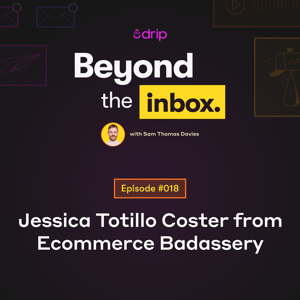
In this episode of Beyond the Inbox, Sam interviews Jessica Totillo Coster, the founder of Ecommerce Badassery and an email marketing expert. Jessica shares her insights on how to optimize email marketing campaigns, the importance of having a face for your brand, and the power of quizzes for lead generation.
One of the key takeaways from the episode is the importance of email marketing for e-commerce businesses. Jessica emphasizes that email marketing can be a highly effective way to generate revenue and that many ecommerce businesses are leaving money on the table by not taking advantage of email. She also notes that many businesses don't realize the power of email and that even large companies can benefit from optimizing their email marketing campaigns.
Jessica also discusses the importance of having a face for your brand and how this can help to build stronger relationships with your customers. She notes that customers often connect more with a person than with a brand and that having a face for your brand can help to create a more personal connection with your audience.
Another key takeaway from the episode is the power of quizzes for lead generation. Jessica explains that quizzes can be a highly effective way to grow your email list with people who are interested in what you sell. She also notes that quizzes can be a fun way to engage with your audience and that they can help to segment your audience based on their interests and needs.
Throughout the episode, Jessica emphasizes the importance of testing and experimentation in email marketing. She notes that there is no one-size-fits-all solution and that what works for one business may not work for another. She also stresses the importance of planning and consistency in email marketing and recommends that businesses have a content calendar in place to ensure that they are sending regular and relevant emails to their audience.
In summary, this episode of Beyond the Inbox provides valuable insights into the world of email marketing for ecommerce businesses. Jessica Totillo Coster shares her expertise on how to optimize email marketing campaigns, the importance of having a face for your brand, and the power of quizzes for lead generation. Whether you are a small startup or a multi-six-figure company, there is something in this episode for every ecommerce business owner looking to grow their revenue and build stronger relationships with their customers.
Show Notes
- (00:00) Introduction
- (02:47) Jessica's background
- (04:30 Why email marketing is important for ecommerce businesses
- (06:20 Common mistakes small e-commerce businesses make with email marketing
- (08:30) How often to send emails
- (10:20) The importance of planning and testing
- (12:30) The power of having a face for your brand
- (14:50) How to be comfortable putting yourself out there
- (17:00) How to create content for your email marketing
- (19:00) How to create a content calendar
- (21:10) What's working in ecommerce right now
- (23:00) The power of quizzes for lead generation
- (25:20) The importance of segmentation
- (27:10) The importance of planning for campaigns
- (29:50) Where to find Jessica and her resources

In this episode of Beyond the Inbox, Sensi Graves, founder of Sensi Graves Swim, shares her journey from struggling with imposter syndrome and fear of failure to becoming the face of her brand. She emphasizes the importance of humanizing her business through authentic storytelling and showcasing diverse body types.
Graves believes that as an e-commerce brand, it is important to have a face for the brand, especially on social media, as it allows people to connect and lends authenticity to the business. She believes that showing a face helps people believe in the brand, and it allows for a direct connection with customers that can help with feedback and product development.
Graves shares that the customer journey for Sensi Graves Swim starts with building awareness around the differentiating factors of the brand and leading people into the story as quickly as possible. She uses a variety of methods to achieve this, including the Girls Who Rip series, which shows athletes and customers wearing their suits, highlighting them, and using their experiences to resonate with potential customers.
The brand's marketing strategy involves a mix of product-focused and storytelling-focused emails, with two emails sent out every week. The focus is on being intentional with the message and thinking about how to show the beauty and femininity that is being a woman. The brand also uses welcome series and automations to introduce customers to the brand and its differentiating factors.
Graves believes that sustainability is a critical issue for businesses to address, and the brand approaches new products by asking where it fits into the line and what purpose it serves. They also strive to make products as sustainably as possible and are continually looking for ways to improve. The focus is on progress, not perfection.
To elevate women in water sports and the brand's message, Sensi Graves Swim plans to dive into more storytelling around women in their community, highlighting more athletes and sharing community stories. The brand is also evaluating its entire line to see what pieces are working, what are not, and where to move forward.
Graves's message to entrepreneurs is to step into their power and know that showing themselves can help others shine their light and learn to believe in themselves. She emphasizes that authenticity is key, and behind the scenes, stories can help people connect with the brand on a deeper level.
In summary, Sensi Graves Swim is a brand that prioritizes sustainability and authenticity. It strives to humanize the business by connecting with customers through storytelling and showcasing diverse body types. The customer journey starts with building awareness around the differentiating factors of the brand, and the focus is on progress, not perfection.
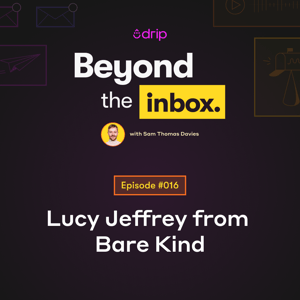
In this episode of Beyond the Inbox, Lucy Jeffrey, the founder of Bare Kind, a sustainable sock company that supports animal conservation, shares her insights on the challenges of marketing a low-cost product, the impact of radio ads on customer acquisition, and the power of community building through podcasting and social media. She also discusses her plans for scaling the company and her vision for supporting animal conservation through profitable growth.
Lucy shares that Bare Kind has seen impressive growth in customer acquisition through radio ads, with over 50% of new customers attributing their discovery of the company to radio. However, she notes that it can be difficult to attribute customer acquisition to specific channels, even on Facebook or Google. Bare Kind's low-cost products make it easier to convert customers quickly, but Lucy explains that they still focus on building trust with customers through email marketing and a post-checkout survey that asks customers where they found the company.
The company's success has led to the challenge of managing its large product range. Lucy explains that they are constantly adding new products and focusing on animal designs that are nostalgic for UK customers. They are also doubling down on wholesale marketing, which has lower costs than DTC marketing and provides consistent revenue. Lucy notes that they are trying to grow from six to seven figures in revenue and that she wants to scale the company globally to maximize profits for animal conservation.
Lucy also discusses the importance of community building through podcasting and social media. She and her partner have started a podcast called Candid Founders, which discusses the challenges of running a business and is part of a YouTube channel that focuses on wholesale marketing. Lucy believes that building a community of like-minded brands is essential for growing the company and supporting animal conservation.
Overall, Lucy's insights provide valuable lessons for entrepreneurs looking to scale their businesses while remaining true to their values. Bare Kind's focus on sustainable products and animal conservation has proven successful, and Lucy's approach to marketing and community building is a model for other businesses looking to grow in a crowded market.
Show Notes
- (0:00) Introduction
- (1:07) Lucy's background and the founding of Bare Kind
- (4:16) Challenges of marketing a low-cost product
- (5:51) Impact of radio ads on customer acquisition
- (8:18) Customer life cycle and post-purchase flows
- (10:05) Seasonal campaigns and planning email campaigns
- (11:48) Importance of understanding customer needs
- (13:20) Community building through podcasting and social media
- (16:33) Product line extension and decision-making based on data
- (19:10) Doubling down on wholesale as a marketing channel
- (22:21) Building a community and personal brand
- (27:28) Where to learn more about Bare Kind
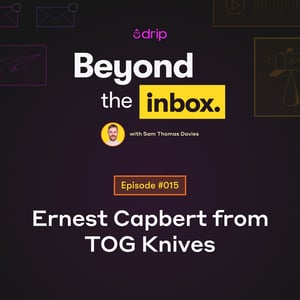
In this episode of Beyond the Inbox, Sam catches up with Ernest Capbert, Commercial Director at TOG Knives. The company specializes in high-quality, Japanese-style kitchen knives that are sold directly to consumers through their website.
Ernest shares the story behind TOG Knives, which began with Bert, the company's founder, and his passion for creating the best kitchen knife in the world. The company has since grown, with a focus on customer education and product quality.
Ernest discusses TOG Knives' customer lifecycle and how the company is targeting potential customers through various channels, including paid media, newsletters, and automated flows. The website is product-led, with a focus on educating potential customers on the features and benefits of each knife.
The company's most significant challenge, according to Ernest, is weaning its dependency on paid media and growing its database of loyal customers. They are working on ways to engage customers more deeply, including offering exclusive content and creating a community around the brand.
Ernest also touches on the company's product line extension, which is focused on creating products that complement their knives. One example is a range of foldable knives, which have been successful in attracting new customers. The company is also exploring ways to offer lower-priced items to engage customers at a lower price point.
While TOG Knives has experienced challenges due to the pandemic, the company has been successful in adapting to the changing market conditions. They have found ways to engage customers through virtual events and have continued to focus on product quality and education.
In summary, TOG Knives is a company that is focused on creating high-quality kitchen knives and educating customers on the benefits of using them. They are working on growing their database of loyal customers and engaging them more deeply through exclusive content and community-building initiatives. The company is also exploring product line extensions to complement its knives and offer lower-priced items. Despite the challenges posed by the pandemic, TOG Knives has demonstrated resilience and adaptability, positioning them for continued success in the future.
Show Notes
- (08:38) Sam asks about the brand's customer lifecycle
- (09:01) Ernest explains the product-led approach to the customer journey, which includes paid media, newsletters, automated flows, and website visitors
- (10:00) Ernest discusses the importance of getting visitors to buy a Japanese kitchen knife and how they use testimonials and reviews to encourage them
- (11:21) Ernest talks about their review of their current flows and automations and how they are doing market research to strengthen their value proposition
- (11:36) Sam inquires about the welcome flow and other flows
- (12:26) Ernest explains how they're focusing on the sign-up journey and abandoned cart flows and how they're working on the lapsed and dormant flows
- (13:14) Ernest discusses the importance of their database, which they use to send promos and value-adds to customers who are engaged
- (14:26) Sam asks for examples of typical email campaigns they send out to promote their products
- (14:37) Ernest explains the knife buying guide, which educates customers on the different types of knives and their uses, and mentions that they have videos of Bert and other chefs talking about the knives
- (16:50) Sam asks if there are certain holidays where people are more likely to splurge on expensive items, and Ernest explains that they haven't had much luck with holidays but see a lift in sales during Q4
- (18:01) Sam asks about the biggest challenges and opportunities facing the company, and Ernest discusses the challenge of weaning off their dependency on Facebook and Instagram ads and focusing on growing their database of loyal customers
- (20:26) Sam asks about the Law of Line Extension and how TOG Knives is expanding its product line without diluting its brand, and Ernest explains that they're focusing on kitchen knives and products that complement their use
- (23:01) Ernest talks about their new strategy of offering a massive discount on their Santo knife to customers who buy a foldable knife, which they're promoting with a real-time QR code
- (24:38) Ernest discusses the challenge of weaning off their dependency on Facebook and Instagram ads and growing their database of loyal customers who engage with their story and continue to buy products
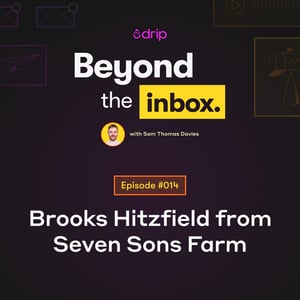
In this episode of Beyond the Inbox, Sam and Brooks Hitzfield, the Director of Digital Marketing at Seven Sons Farm, discuss the marketing strategies that have helped Seven Sons grow their business. Brooks shares his insights into the importance of email marketing, segmentation, and customer avatars.
One key takeaway from the conversation is the emphasis on understanding customer needs. Brooks stresses that the more an email is targeted towards a particular customer's needs, the more likely they are to open and engage with it. To achieve this, Brooks uses Drip, which allows for a high degree of segmentation. He notes that it's essential to segment customers based on where they are in their journey with the company and to make sure that people who are new to the company and going through nurture campaigns are getting the right messages.
Brooks also discusses the role of social media in their marketing efforts. While Seven Sons have a presence on social media, Brooks notes that they haven't seen much organic growth from these platforms. Instead, they use social media primarily for advertising through Facebook and Google. He emphasizes that their strongest customer base comes from word-of-mouth referrals and organic search, which has helped them maintain consistent growth rates year over year.
Customer avatars are another crucial aspect of Seven Sons' marketing strategy. Brooks explains that the Marketing team has identified four customer avatars, including people who are proactively taking control of their health, people who are reacting to a health crisis, people who care about animal welfare, and people who are environmentally focused. Brooks notes that they have optimized their content to hit each of these avatars, with the focus being on making sure that the messaging stays holistic.
In conclusion, Brooks emphasizes the importance of staying true to their brand values. He notes that Seven Sons takes the responsibility of providing high-quality products very seriously and that they take pride in the nerdy side of agriculture. He also mentions that the company has recently started working with an SEO firm to create recipe and blog content, which has helped them rank for both informational and commercial intent keywords.
Overall, the conversation highlights the power of email marketing and brand authenticity. By understanding customer needs, utilizing segmentation, and staying true to its values, Seven Sons have been able to maintain consistent growth rates and a strong customer base.
Show Notes
- (18:28) Brooks discusses the role of Chad in their digital marketing team
- (19:14) Brooks talks about how they segment customers and use workflows in Drip
- (21:22) Sam asks about Seven Sons' use of social media, and Brooks discusses how they use it for advertising and brand awareness
- (24:16) Sam asks about Seven Sons' SEO strategy, and Brooks talks about optimizing for product keywords and creating content for recipe and blog keywords
- (26:26) Brooks discusses how word of mouth and direct traffic has been important for Seven Sons, but they are now focusing on advertising for growth
- (29:21) Brooks talks about the different customer avatars they target and how they create content for each one
- (33:32) Brooks emphasizes the importance of trust and responsibility in their supply chain and business practices
- (35:17) Brooks provides links to the Seven Sons website and YouTube page

In this episode of Beyond the Inbox, Sam and John discuss the pricing structure of BattlBox, a subscription service that delivers outdoor and survival gear to its customers. Jon explains the evolution of the pricing structure, which started with a basic box priced at $25 and a Pro Plus box priced at $150. Surprisingly, the Pro Plus box turned out to be the most popular among customers, with 45% of the customer base opting for it.
John attributes the success of the Pro Plus box to several factors, including the way it is positioned in the product lineup and the community of customers who showcase and promote the product. The BattlBox team also uses various mechanisms, such as email and SMS campaigns, to nudge customers toward the higher-priced tiers.
The conversation then shifts to churn and how BattlBox handles it. Jon describes the company's robust approach to passive churn, which involves a series of personalized emails and SMS messages to customers whose subscription payments have failed. The company also has a custom dashboard that offers different retention options to customers who have had at least two renewals.
Sam and John also delve into the importance of community in BattlBox's success. Jon explains how the company builds a community through content and engagement and how this community helps to retain customers and promote the brand. The BattlBox Facebook group is a thriving community of active subscribers who engage with one another and with the brand.
Finally, the conversation concludes with a discussion of John's blog, where he shares the ups and downs of the BattlBox journey. He emphasizes the importance of sharing losses and failures, as well as successes, in order to provide a more realistic picture of entrepreneurship. Overall, the podcast provides valuable insights into the pricing, churn, and community-building strategies of a successful subscription service.
Show Notes
- (0:00) Introduction
- (0:30) Overview of BattlBox
- (2:00) Launching BattlBox
- (5:00) Building the BattlBox team
- (6:30) BattlBox's pricing strategy
- (12:26) Most popular pricing tier
- (13:36) Nudging customers to upgrade
- (16:34) Preventing gamification
- (17:08) Nudging customers to upgrade through email
- (18:07) Retaining customers through community building
- (20:02) Battling churn
- (22:36) Win-back sales team
- (27:26) Building community through content
- (31:52) Conclusion and where to find BattlBox

In this episode of Beyond the Inbox, Lisa Mastela, the Founder and CEO of Bumpin Blends, a functional smoothie company, joins the show to share her insights on how she has built a successful ecommerce brand by using personalized quizzes, text messaging, and email automations to engage with customers. She also highlights the importance of founder presence, community building, and continuous experimentation in marketing.
Lisa reveals that she is not comfortable being on camera or on social media, but she recognizes that if she runs a small business, especially in the CPG industry, she needs to be the face of the company. She shares how they have used video marketing to showcase her story and how it has helped to grow their customer base. She also highlights their use of Tulsa, an inexpensive platform for small businesses, to showcase their brand and take customers on a journey.
The episode also covers the importance of community building. Lisa emphasizes that it is important to make sure that all marketing channels work together to create a cohesive customer experience. She mentions that to achieve this, she uses a whiteboard to draw out the web and tie everything together, making sure that the customer journey is addressed and organized in a way that makes sense.
Lisa also talks about experimentation in marketing and sets aside a budget each quarter to try something new and different, even if it might fail. She believes that relying too heavily on one marketing channel can be dangerous, and it is important to continuously experiment. She shares the results of their experimentation with macro-influencers, where an influencer with just one million followers brought in 70 sales, while an influencer with almost eight million followers brought in only two.
Overall, the episode is full of insights on how to build a customer-centric brand with a scrappy mindset. It highlights the importance of founder presence, community building, and continuous experimentation in marketing. It is a great listen for anyone who is looking to start or grow their ecommerce business.
Show Notes
- (00:00): Lisa Mastela, the Founder and CEO of Bumpin Blends, joins the show to share her insights on how she has built a successful ecommerce brand.
- (10:47): Lisa talks about how they have used video marketing to showcase her story and how it has helped to grow their business.
- (12:23): Lisa discusses how they are using personalized quizzes to engage with customers and how it has been successful.
- (15:21): Sam asks Lisa about how they are using text messaging to engage with customers, and Lisa shares how it has been a fun way to interact with customers.
- (19:39): Lisa talks about their email automations, including abandoned cart, browse abandoned, and win-back flows.
- (23:24): Lisa shares how they allocate a budget for marketing experiments each quarter to continuously experiment with new marketing initiatives.
- (28:08): Lisa discusses the importance of tying all marketing channels together to create a cohesive customer journey and community building.
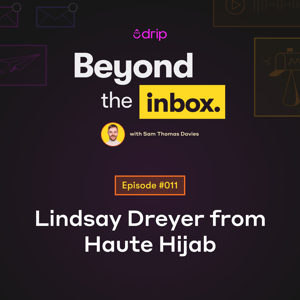
In this episode of Beyond the Inbox, we talk to Lindsay Dreyer, the CMO of Haute Hijab, a fashion and lifestyle brand that creates stylish and comfortable hijabs for Muslim women. With over 300,000 followers on Instagram alone, Haute Hijab has built a passionate community of customers who love the brand's products and values.
During the interview, Lindsay shares her insights on how to build a strong brand community, the importance of SMS marketing, and how to make the most of social media platforms like Instagram and Facebook. She emphasizes the power of SMS marketing, explaining that customers who opt-in to receive text messages from a brand are more likely to be highly engaged and passionate about the brand. She recommends a weekly cadence for SMS messaging and emphasizes the need to monitor metrics like unsubscribes and opt-outs to determine the appropriate frequency.
Lindsay also discusses the importance of building a strong brand community, which she sees as a critical component of Haute Hijab's success. She explains that the brand's Facebook group is a safe space for women to communicate about hijab or other issues on their minds. The group has become a powerful touchpoint in Haute Hijab's customer journey, and Lindsay emphasizes the need to moderate the group and ensure that it remains a safe space for customers.
In addition to discussing SMS marketing and brand community, Lindsay also shares her insights on the role of social media in Haute Hijab's marketing strategy. She explains that the brand's approach to social media is to view all of its marketing channels as working collectively and in tandem. She describes various social media channels and how Haute Hijab uses each one to reach its target audience, including influencer marketing, paid ads, and Instagram Live sessions with the brand's founder, Melanie.
Lindsay also discusses Haute Hijab's Tuesday drops, which are limited edition scarves made from dead stock fabric. She explains that the brand drops four to eight hijabs every Tuesday, and customers name the product on Instagram. The winner receives a hundred community rewards points, which they can redeem for a future purchase. The Tuesday drops have become a highly anticipated event for Haute Hijab's customers, and Lindsay emphasizes the importance of consistency in marketing channels like email.
Overall, Lindsay's insights on building a strong brand community, the importance of SMS marketing, and the role of social media in Haute Hijab's marketing strategy provide valuable lessons for ecommerce marketers.
Show Notes
- (03:05) Lindsay explains how Haute Hijab started and how it built its brand community.
- (05:10) The power of SMS marketing and the importance of having highly engaged customers.
- (07:29) The benefits of moving customers from one channel to another.
- (09:59) The value of SMS marketing and the personal touch it provides for customers.
- (11:48) The importance of balancing the frequency of messaging with the need to rise above the noise.
- (14:23) How Haute Hijab is using different channels to convert visitors into customers.
- (17:30) The importance of gathering information from customers, segmenting them, and tailoring messages to their preferences.
- (20:04) The sustainability of Haute Hijab's weekly drops and the role of social media in their marketing strategy.
- (23:40) The approach to social media and the different roles of Facebook and Instagram in their marketing strategy.
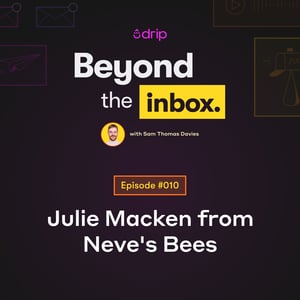
In this episode of Beyond the Inbox, we talk to Julie Macken, founder of Neve’s Bees, a UK-based company that sells handmade, all-natural skincare products. Throughout the interview, Julie shares her insights on various topics, including customer research, email automation workflows, and SEO. She also discusses the importance of staying true to your brand's values and how it can differentiate you from your competitors.
Julie highlights the importance of customer research and the value of uncovering hidden objections that may arise when selling to a particular segment. She emphasizes the need to understand the target audience's age range, interests, and playstyle when developing new projects. Moreover, she stresses the importance of engaging with customers through email automation workflows to enhance brand engagement and increase sales. Julie offers valuable insights into the different email automation workflows that work well for Neve's Bees, including abandoned cart emails, introductory emails, and follow-up emails.
Julie also shares her experience with SEO content and the importance of long-tail keywords. She suggests using Ahrefs, a tool that helps find high-volume, low-competition, long-tail keywords, to create a blog post with the potential to bring in traffic to the website. She also highlights the importance of converting first-time visitors into email subscribers and using email automation workflows to convert them into customers.
Throughout the interview, Julie emphasizes the importance of staying true to your brand's values and how it can differentiate your business from competitors. She stresses the need to work towards a business model that aligns with your values and aspirations rather than working towards someone else's agenda. Julie also shares the importance of enhancing brand engagement through customer engagement and the need to create a synergy between the brand and the customer.
Overall, Julie's insights provide valuable information for eCommerce founders looking to improve their customer engagement and increase sales. Her experience with SEO content and email automation workflows offers practical tips for businesses looking to optimize their online presence. Moreover, her emphasis on staying true to your brand's values provides a refreshing perspective on how to differentiate your business from competitors. Listeners can learn more about Neve's Bees by visiting their website or following them on social media.
Show Notes
- (00:00) Introduction
- (01:05) Julie's background and how she started Neve's Bees
- (03:56) The importance of customer research
- (05:50) The hidden objections to selling to a particular segment
- (07:55) Email workflows that are working for Neve's Bees
- (11:42) The importance of enhancing a brand through email automation
- (15:25) Neve’s Bees’ partnership with Plantlife and No Mo May
- (19:30) Keeping the business at a certain size and staying true to brand values
- (22:15) The importance of blogging and SEO content
- (26:45) Where to find Neve's Bees

In this episode of Beyond the Inbox, we dive into the world of antiperspirant solutions with Jack Benzaquen, the founder and CEO of Duradry. Jack shares his experience building a brand that appeals to a sensitive customer base and offers insights into how he's been able to leverage user-generated content and customer feedback to drive his brand's growth.
One of the main challenges Jack discusses in the episode is collecting customer feedback. He explains how Duradry combines customer service tickets, email campaigns, and more to arrive at the best path for executing on customer needs. Jack emphasizes the importance of chasing the truth and finding the balance between what customers say they want and what a brand thinks is the best way to serve them.
Authenticity is essential in building trust with potential customers, and Jack shares Duradry's approach to driving reviews and creating user-generated content. He explains how they incentivize customers to leave written and video testimonials and why authenticity is key.
The conversation then shifts to e-commerce strategies, and Jack shares his thoughts on optimizing site navigation. He talks about how he's working to streamline the customer journey through the Duradry site and how he's approaching email automation, including the welcome flow and new automation that offers one-off customers the opportunity to buy products at a discount every two months.
Tune in to this episode of Beyond the Inbox to learn from Jack's experience building a standout brand in the antiperspirant market and discover the marketing strategies he's using to drive growth and customer loyalty.
Show Notes
- (01:13) Jack explains that he founded Duradry because he himself suffers from hyperhidrosis and was disappointed with the products on the market.
- (02:56) Jack discusses the process of launching a product and emphasizes the importance of iteration and continuous improvement.
- (04:34) Jack explains how Duradry collects customer feedback through a combination of customer service tickets, email campaigns, and focus groups.
- (06:27) Jack discusses how to find the balance between what customers say they want and what a brand thinks is the best way to serve them.
- (08:27) Jack explains how Duradry incentivizes customers to leave authentic reviews and user-generated content.
- (09:55) Sam and Jack discuss skepticism as a major objection customers may have when considering purchasing a product and how to address it.
- (13:18) Jack offers advice for smaller e-commerce brands on how to incentivize reviews and drive user-generated content.
- (14:57) Jack discusses Duradry's use of Bounty to incentivize influencers to create videos about their products.
- (19:35) Jack explains how Duradry is turning non-buyers into buyers and first-time buyers into repeat customers through email automation and segmentation.
- (23:33) Sam and Jack discuss the importance of site navigation and how Duradry is working to improve it for their customers.
- (26:46) Jack encourages listeners to visit the Duradry website at duradry.com.
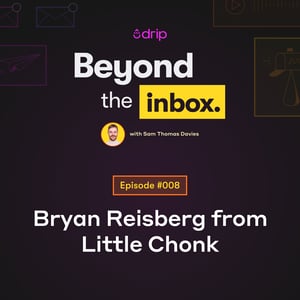
In this episode of Beyond the Inbox, Sam talks to Bryan Reisberg, co-founder of Little Chonk, a pet supply brand. Bryan shares his journey of creating viral content for his dog Maxine, which eventually led to the creation of Little Chonk. He discusses the importance of timing, building a community, and creating something people want.
Bryan talks about his experience of engaging with his audience through DMs and how it helps to build a close relationship with his followers. He emphasizes building an ecosystem where customers can customize their life with their pets. Bryan highlights the importance of brand equity and how it can be built in different spaces through Mindshare on the internet.
Bryan talks about Little Chonk's customer lifecycle and how they remain agile in listening to their customers and figuring out what they want. He mentions the importance of word-of-mouth marketing, especially in the pet community, and how pet parents are eager to talk about their pets and show them off. He talks about stoking flames over a period of time and planning for what you do in the days after launch until people get their product. Bryan also talks about the importance of building a community and making people feel seen and heard.
Bryan also discusses the successful launch of Little Chonk's Maxine One backpack and the planning that went into it. He talks about how they built up anticipation for the launch through teasers and breadcrumbs. Bryan mentions the importance of storytelling in their content and how they showed people how to train their dogs to get into a backpack through educational content. He also talks about how they partnered with the MTA to create a month-long content program that helped them grow and set everybody up for success.
Bryan talks about the future of Little Chonk and their excitement for their next product launch. He emphasizes the importance of maximizing resources and getting in front of a lot of people very quickly. He mentions their website and social media channels, where people can follow Little Chonk and get updates on their latest products and content.
In summary, Bryan Reisberg shares his insights on building a successful pet supply brand through engaging with the audience, building a community, and creating something people want. He highlights the importance of brand equity, customization, and word-of-mouth marketing in driving repeat purchases. Bryan's story is a testament to the power of storytelling and building a loyal following through authentic engagement.
Show Notes
- (0:00) Introduction
- (0:41) Bryan Reisberg's background and how he started Little Chonk
- (5:28) The importance of building a community and understanding customers' needs
- (9:09) How Little Chonk thinks about the customer journey and making the experience as fluid as possible
- (11:29) The launch strategy for the Maxine One backpack and how they built up anticipation through social media
- (17:35) The success of the Maxine One launch and how they used the MTA to promote the product
- (23:38) How Little Chonk drives repeat purchases through customization and building brand equity
- (28:51) Little Chonk's plans for the future, including a new product launch
- (29:25) Little Chonk's customer lifecycle and how they encourage word-of-mouth referrals
- (33:33) Bryan Reisberg's excitement for Little Chonk's upcoming projects and where to find them
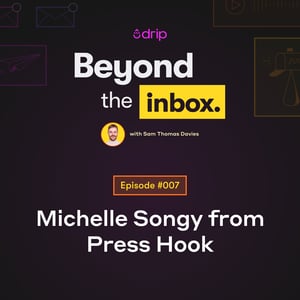
In this episode of Beyond the Inbox, Michelle Songy, founder of Press Hook, shares her insights on the importance of PR and storytelling for small ecommerce brands in today's digital age. She emphasizes the need for brands to build a brand story that resonates with their customers, especially the Gen Z generation, who value authenticity and emotional ties.
Songy discusses how brands can leverage their founder's story to reach out to media outlets and connect with their audience. She notes that storytelling is crucial in connecting with media outlets as it can help brands stand out and get coverage faster. She recommends that smaller ecommerce brands should treat PR like business development, making personal connections with journalists and editors, and understanding the audience and the publication's needs.
Moreover, Songy highlights the role of affiliate marketing in PR and editorial space, stating that it has become nearly impossible to garner media coverage without it. She notes that smaller ecommerce brands can compete with larger companies by finding the right publications and writers and sending relevant pitches that align with what the publication writes about.
When it comes to the types of content that ecommerce brands can go after, Songy suggests product roundups, product reviews, trend stories, and more. She recommends being timely and finding the right person to break a story, as well as offering exclusives to publications before product launches to increase the chances of coverage.
Finally, the episode provides valuable insights into the world of PR and how small ecommerce brands can use storytelling and affiliate marketing to compete with larger companies and get media coverage. Small ecommerce brands should avoid PR mistakes like trying their hand at media outreach without a clear strategy. Instead, they should focus on building personal connections with journalists and editors, understanding the audience and the publication's needs, and offering relevant and timely pitches that align with what the publication writes about.
Show Notes
- (0:43) Michelle Songy's background and the inspiration for creating Press Hook
- (4:08) The importance of storytelling in PR, especially for Gen Z
- (6:29) Common PR mistakes that small ecommerce brands make
- (8:14) The role of personal connections in PR and understanding the audience and the publication's needs
- (10:46) The importance of affiliate marketing in PR and editorial space
- (11:50) How smaller ecommerce brands can compete with larger companies by finding the right publications and writers and by sending relevant pitches
- (17:33) The types of content that ecommerce brands can go after
- (19:30) Being timely and finding the right person to break a story, as well as offering exclusives to publications before product launches
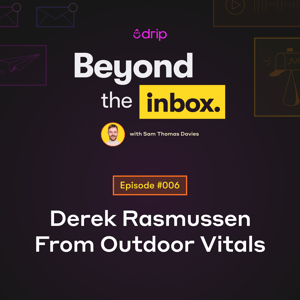
In this episode of Beyond the Inbox, host Sam Thomas Davies interviews Derek Rasmussen, the Marketing Director of Outdoor Vitals, a company that specializes in manufacturing sporting goods for backpacking and camping. They discuss the importance of core values in a marketing strategy, the customer lifecycle, and the power of email marketing.
Derek Rasmussen starts by explaining that Outdoor Vitals' gear is not just about being lightweight, but it's also about being functional and durable. The company invests in high-quality materials to create gear that will perform exceptionally well, even in the harshest of conditions. The company also prioritizes sustainability and is working towards creating eco-friendly products that have a minimal impact on the environment.
Rasmussen shares that he enjoys helping people find value in a product and feel passionate about it. That's why he's excited about marketing Outdoor Vitals' gear and educating people on how to use it correctly. He explains that the company's marketing strategy is not just about selling a product, but it's about building a community of like-minded individuals who share a passion for the outdoors.
Outdoor Vitals has five core values that guide all of its decisions, including marketing and strategy decisions. These core values are live ultralight, be tenacious, ask why, act responsibly, and hike in their shoes. The first core value, live ultralight, is not just about ultralight gear but also about simplification and enjoying more without overcomplicating things. Rasmussen gives an example of how he and his wife travel with only one backpack each, which gives them more freedom and enjoyment on their trips.
Another core value, “ask why,” is about not accepting the status quo and always looking for a better way to do things. Rasmussen explains that asking why is important in marketing, as well as in all aspects of the business. To stand out from other brands, Outdoor Vitals focuses on performance, not price. They invest in high-quality materials and rely on an honest pricing model. Rather than offering discounts, they provide value in other ways, such as offering a free editable backpacking checklist in exchange for an email address.
Outdoor Vitals also places a strong emphasis on community and customer engagement. They have a closed Facebook group for members, where they can get advice and support from like-minded people. They also hold Q&A sessions for new product launches, which creates confidence and value for their email list.
Rasmussen says that email accounts for a huge percentage of their revenue and that every time they send an email, they see a boost in sales. They plan to capitalize on this by exploring new ways to add people to their email list and increasing their affiliate work.
Outdoor Vitals' membership program provides members with better deals, discounts, and early access to product launches. The membership program also includes access to a closed Facebook group, where members can ask questions and get support from other like-minded people. Rasmussen talks about how the membership program is more than just a way to get discounts, it's a way to build a community and connect with other outdoor enthusiasts.
Overall, Outdoor Vitals' core values and marketing strategy focus on providing value, simplification, and performance-driven gear. Their emphasis on community and engagement sets them apart from other brands and creates loyal customers. Rasmussen emphasizes the importance of providing value to customers and helping them connect with the outdoors. He believes that marketing is about more than just selling a product; it's about helping people find value in that product and feel passionate about it.
Listeners of Beyond the Inbox can learn about Outdoor Vitals, its core values, and its marketing strategy. They can also get insights into how the company provides value to its customers and helps them connect with the outdoors. Outdoor Vitals is a company that is focused on more than just selling gear; it's a company that is committed to building a community of outdoor enthusiasts who share a passion for the outdoors and a commitment to sustainability.

In this episode of Beyond the Inbox, Yong-Soo Chung, the founder of Urban Everyday Carry (Urban EDC), talks about his journey from being a software engineer in the blockchain industry to starting his own ecommerce brand. We cover a broad range of topics related to building a successful ecommerce brand, including community-based ecommerce, email marketing, and personal branding. Yong-Soo shares his insights and experiences with each of these areas, providing valuable information to anyone looking to build an ecommerce brand or improve their marketing strategy.
One of the key takeaways from the interview is the importance of community-based ecommerce. Yong-Soo believes that building a community around your brand is crucial for increasing customer loyalty and driving sales. He shared how he created a Facebook group and a paid membership program to build a trusted community of customers around his brand. By focusing on building relationships with his customers and giving them a sense of belonging, Yong-Soo has been able to create a strong foundation for his brand that will last for years to come.
Another important marketing channel we discuss is email marketing. Yong-Soo emphasizes the importance of email marketing in driving sales and shares his email marketing strategy, which includes a welcome series, first purchase series, an abandoned cart workflow, and regular promotional emails. He also talks about the importance of personalization and segmentation in email marketing and how he tailors his emails to different customer groups. By using email marketing effectively, Yong-Soo has been able to build a loyal customer base that keeps coming back for more.
We also delve into the topic of personal branding. As an ecommerce entrepreneur, Yong-Soo emphasizes the importance of building a personal brand. He shares his journey of building his own personal brand and how he overcame his fear of putting himself out there. He explains how personal branding can help build relationships and increase the luck surface area. Yong-Soo provides tips for getting started with personal branding, including setting goals, focusing on daily practice, and not worrying about the results.
Overall, this episode provides a detailed insight into the strategies and tactics used by Yong-Soo to build a successful ecommerce brand and promote it through various marketing channels. It is a valuable resource for anyone looking to build an ecommerce brand or improve their marketing strategy. The interview is full of practical advice and actionable insights that can help entrepreneurs take their businesses to the next level.
Show Notes
- (07:47): Yong-Soo Chung talks about the financial regulations that impacted the blockchain industry, causing his team to halt progress.
- (08:45): Yong-Soo Chung explains why he decided to start selling knives online.
- (09:39): Yong-Soo Chung discusses the importance of execution risk in his decision to start Urban EDC.
- (10:34): Yong-Soo Chung talks about the importance of community in ecommerce and the development of Urban EDC's paid membership program.
- (11:04): Yong-Soo Chung explains the benefits of a paid membership program, including access to exclusive gear and a trusted community.
- (13:28): Yong-Soo Chung talks about the importance of email marketing in Urban EDC's sales engine, including the use of welcome series, first purchase series, abandoned cart emails, and segmented emails.
- (15:09): Yong-Soo Chung discusses the importance of community in the future of ecommerce and recommends that brands create a regular event or habit for customers to look forward to.
- (20:15): Yong-Soo Chung talks about the importance of personal branding and shares his reasons for posting daily on social media.
- (23:42): Yong-Soo Chung talks about how to get started with posting on social media, including treating posts as experiments, focusing on daily practice, and not worrying about results.
- (31:20): Yong-Soo Chung shares where listeners can learn more about him and his brands, including GrowthJet and First Class Founders podcast.
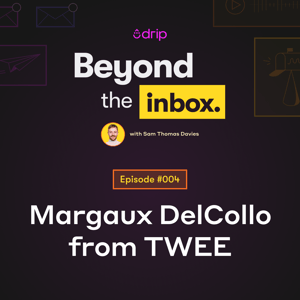
In this episode of Beyond the Inbox, Margaux DelCollo, the co-founder of TWEE, shares her insights on the brand's marketing strategy, which has helped the brand stand out in a crowded market. TWE creates unique and imaginative sidewalk chalks for children that are designed to stimulate their creativity and imagination, and the brand has grown to include other products, such as veggie paints.
Margaux discusses TWEE's approach to email marketing, emphasizing the importance of multiple touchpoints in building a strong connection with customers. She explains that TWE's email marketing is centered around storytelling, and the brand uses a welcome sequence to introduce new customers to the brand and a series of emails that highlight different aspects of the brand's mission and products. This approach allows TWEE to keep customers engaged with the brand and build a loyal customer base.
The conversation also covers TWEE's expansion into other products, including veggie paints, which are powdered-based vegetable pigment paints. Margaux talks about the challenges of creating new products, including working with a team of makers who don't have children and getting feedback from children to ensure the products are engaging. She explains how TWEE is differentiating itself from other sidewalk chalks by creating extraordinary products that allow children to use their imagination and engage in dual play.
Margaux emphasizes the importance of community building in marketing and how TWEE is creating a community of parents who value the brand's eco-friendly and handmade products. She talks about how TWEE is turning first-time customers into repeat customers by continuing to engage with them through email marketing and introducing new products that are in line with the brand's mission.
The conversation also delves into Margaux's background in PR and marketing, which has helped TWEE to position itself as a high-quality, eco-friendly, and handmade brand that provides unique and imaginative products for children. Margaux's experience in PR and marketing has helped TWEE to maintain a high standard for the brand and its products and to create a strong connection with customers through storytelling and engaged email marketing.
Overall, the conversation provides valuable insights into TWEE's marketing strategy and how they are able to stand out in a crowded market by creating extraordinary products and engaging with their customers through storytelling and email marketing. TWEE's approach to marketing is centered around building a loyal customer base and creating a community of parents who value the brand's eco-friendly and handmade products. Margaux's experience in PR and marketing has helped TWEE to maintain a high standard for the brand and its products and to create a strong connection with customers through storytelling and engaged email marketing.
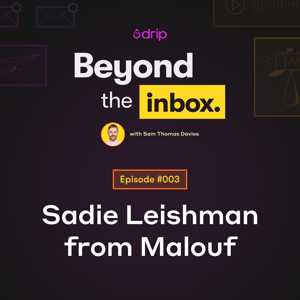
In this episode of Beyond the Inbox, Sadie Leishman from Malouf talks about the challenges of marketing mattresses and how Malouf differentiates itself in a crowded market. She points out that in the bedding and furniture industry, there are certain standards that brands need to meet to stay competitive, such as free shipping, and then suggests that Malouf differentiates itself through trust and a consistent customer experience. Malouf aims to be a partner where customers can find all their sleep products, get tips on sleep, and feel a sense of community around a product and industry that's typically seen as very commodity-based.
Leishman emphasizes the importance of fostering a sense of community among customers, which is focused on the idea that everyone needs to sleep and that good sleep is the foundation for other values in life. She explains that sleep is often the first thing that people prioritize, but it leads to all of the other things that matter, such as being a good parent, employee, or athlete. By focusing on these values, Malouf is able to make sleep products more engaging and personalized.
Leishman also discusses innovative approaches to email marketing, including browse abandonment workflows and SMS. She explains that Malouf has a unique email workflow for browse abandonment where the email says, "We know it's late, we'll be here in the morning, so try and put your phone down, try and get some sleep, and we're here for products that are gonna help when you wake back up." By showing empathy and prioritizing customers' sleep over any purchase that could be made in the wee hours of the morning, Malouf is able to build trust with customers and differentiate itself from other brands that push for the sale all the time.
Leishman emphasizes the value of trust and building long-term relationships with customers, which is crucial for selling high-ticket items like mattresses. She explains that Malouf's 100-night sleep guarantee is a great safety net for customers who are worried or concerned about making a purchase. Additionally, she mentions the role of SMS in a comprehensive marketing strategy, which is a great way to target people with very timely information. SMS is more instant than email, which makes it a great way to offer personalized experiences for customers.
Overall, Leishman highlights the power of email and SMS in building a loyal customer base and fostering a sense of community among customers. By focusing on customer values and meeting them where they prefer to hear from Malouf, the company is able to establish itself as a brand that truly cares.
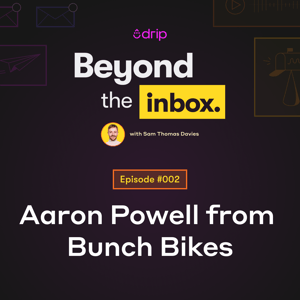
In this episode of Beyond the Inbox, Sam interviews Aaron Powell, the founder of Bunch Bikes, which is North America's largest front-load cargo bike brand. The conversation covers a range of insightful topics related to Bunch Bikes, starting with the buyer's journey for a Bunch Bike. Powell explains that the journey starts with category awareness, where people are not even aware that they can bike with their kids. Then, the journey moves on to overcoming objections such as fitness levels or transportation logistics and finally ends with inspiring customers to see the deeper purpose of biking with their families.
Powell also emphasizes the importance of community and customer service, which are at the core of the Bunch Bikes brand. He explains that customer service is an extension of his own values and personality and that it was difficult for him to delegate that part of the business. Powell also shares how Bunch Bikes focuses on exceeding customer expectations by offering a 14-day trial period, free returns, and white-glove service. The brand's efforts have paid off, as its customer service has received rave reviews, with many customers calling it the best interaction they have ever had with a company.
In addition, Powell shares some unique marketing campaigns that Bunch Bikes has done, such as offering a date night on Valentine's Day with childcare included for customers who purchase a bike. He explains that the campaigns are meant to make a deeper connection with customers beyond just offering discounts or promotions. Powell also discusses the challenges of advertising and how Bunch Bikes is focusing on email marketing campaigns and building a strong website to convert more traffic. He highlights the importance of making a deeper connection with customers and building a sense of community around the brand. Powell underscores that Bunch Bikes' marketing is not just about selling bikes but also about selling a lifestyle and a deeper purpose of family bonding and adventure.
Powell also talks about the impact of appearing on Shark Tank and how it helped increase brand awareness. The episode provides valuable insights into the Bunch Bikes brand, its values, and its marketing strategies. It highlights the importance of community and customer service, as well as the challenges of marketing a unique product. This is a must-listen for anyone interested in entrepreneurship, marketing, or outdoor lifestyle brands. By the end of the episode, you will have a better appreciation for how building a strong community and focusing on customer service can lead to a successful business.
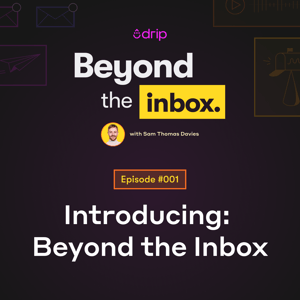
It’s no secret that email is one of the best channels in terms of ROI.
But there’s so much more to a well-rounded marketing strategy than email marketing.
Join Sam Thomas Davies, a Growth Marketing Manager at Drip and the host of a new ecommerce podcast, Beyond the Inbox, for raw and honest conversations with ecommerce founders, marketers, and makers about what’s working in their marketing today—beyond the inbox.
You’ll learn the customer-first strategies top ecommerce brands use to grow their brand’s reach, turn customers into advocates, and much more.
Beyond the Inbox goes live on March 14th, but in the meantime, make sure to subscribe wherever you find your podcasts.
And head over to https://www.drip.com/podcast to get new episodes delivered to your inbox each week.
